ISSUE 168
JULY 2023

ISSUE 168
JULY 2023
Empowering students to make a positive impact
Embedding sustainability into employer-led events


Sustainability education through experiential learning

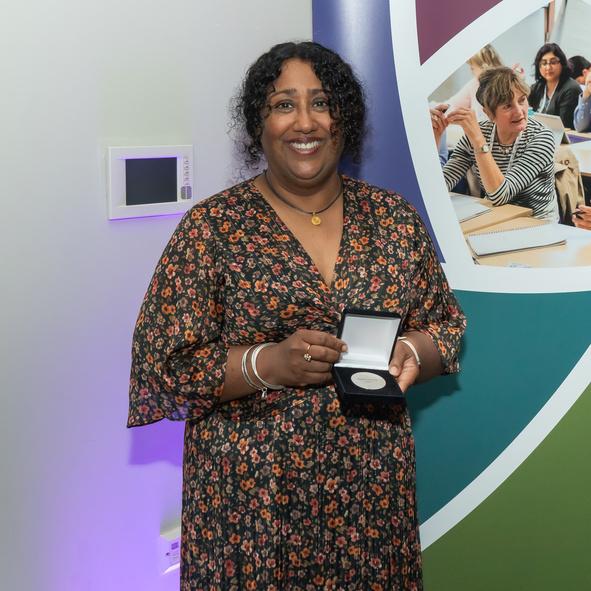
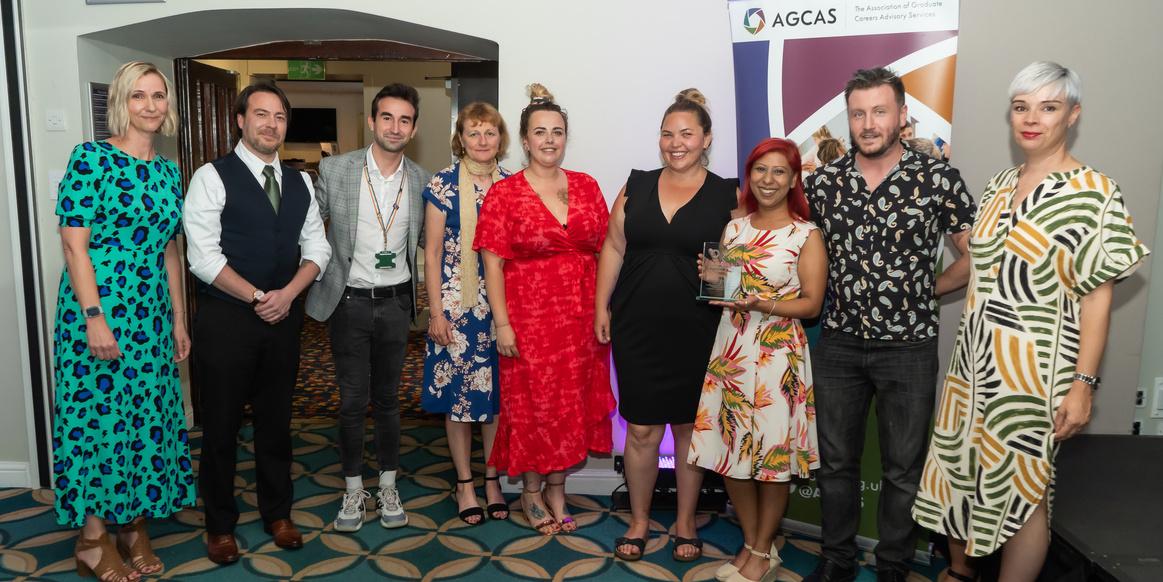

Congratulations to this year's winners!
Read more about the award winning projects and initiatives on the AGCAS website
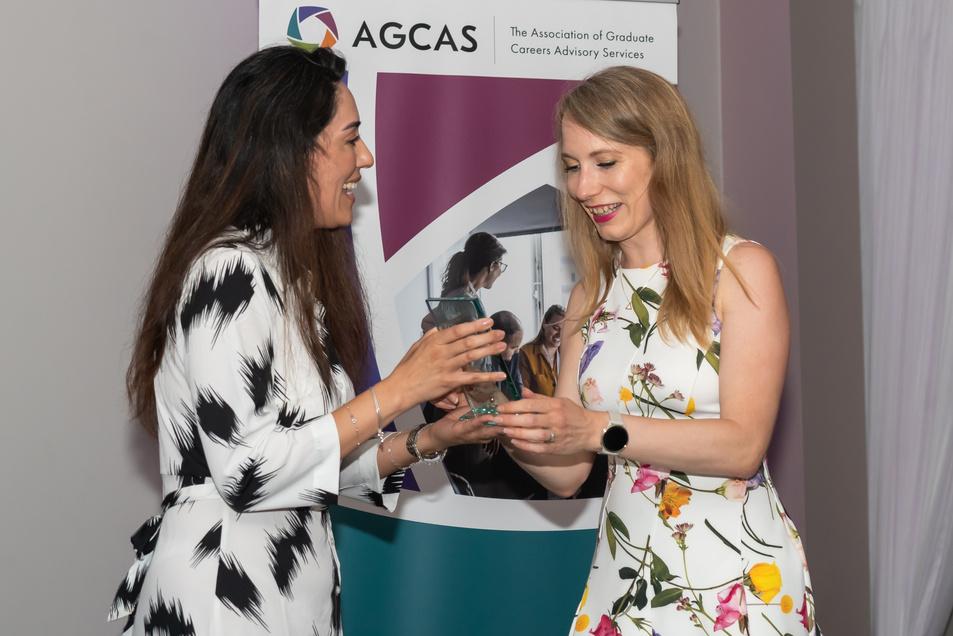
Outstanding Newcomer Significant Contribution John Roberts Memorial
Richard Allen
Leeds Beckett University
President's Medal
Dr Nalayini Thambar
Liz Wilkinson
Shona Johnston
Supporting Student / Graduate Employability


Brunel University
Sponsored by
Andy Morris De Montfort University
Sustainability Impact
University of Exeter
Stephen Nash Durham University
Strategic Innovation
University of Reading
Sponsored by Sponsored by
Equality, Diversity and Inclusivity
BPP University
Sponsored by
Building Effective Partnerships
London Metropolitan University, University of West London, University of Roehampton, Kingston University, University of Hertfordshire, University of Westminster, and partnered with University of Greenwich

Sponsored by
 President's Medal winner Dr Nalayini Thambar
Strategic Innovation award winner University of Reading (presented by Francesca Molina, Unitemps)
Building Effective Partnerships award winners from the consortium of London-based universities (presented by Jemma McAloon, Group GTI)
President's Medal winner Dr Nalayini Thambar
Strategic Innovation award winner University of Reading (presented by Francesca Molina, Unitemps)
Building Effective Partnerships award winners from the consortium of London-based universities (presented by Jemma McAloon, Group GTI)
THE RED SUSTAINABLE ACTION AWARD: LINKING SKILLS AWARDS AND
40
FIFTY SHADES OF GREEN: EQUIPPING STUDENTS FOR CAREERS IN SUSTAINABILITY
University of Nottingham
42
ABERDEEN'S GREEN FUTURE: SUSTAINABILITY THROUGH THE CAREERS SERVICE LENS
University of Aberdeen
44
CHARTING NEW PATHS: CAREERS GUIDANCE AND ACTIVITY THROUGH ENVIRONMENTAL SUSTAINABILITY
University of Leicester
48
Durham
University
THE POWER OF MENTORING: FOSTERING JOB CREATION IN SUSTAINABILITY
sfG MentorNet
STUDENTS MOST VALUE PROFESSIONALS WHEN IT COMES TO CAREERS ADVICE

Phoenix is the digital journal of AGCAS, the Association of Graduate Careers Advisory Services It is published three times a year
To find out more about AGCAS, see www agcas org uk
Created in-house by AGCAS, based on an original design by Marcom www marcom.net
Rish Baruah
University of Stirling
Suzie Bullock
University of Leeds
Sarah Brown
University of Gloucestershire
Wendy Browne
City, University of London
Holly Delafield
University of Bristol
Sophie Hall
Cardiff University
Emma Hill
Edinburgh Napier University
Claire Merriman
Aston University
Kaz Scattergood
University of Liverpool
Sara Tsompanidi
University of Edinburgh
In this issue of Phoenix, we profile the role university careers services are playing in preparing students and graduates for sustainable career opportunities to meet the challenges of climate change The UN International Labour Organization defines a green job as ‘ a decent job that preserves or restores the environment’ Green growth is taking place across all sectors, with new green jobs emerging at pace.
With sustainability becoming an increasingly significant factor in career decision making, the following articles demonstrate how member services are engaging with students and graduates to increase their awareness of the range of sustainable careers available. Through sustainability challenge projects, students are increasing their knowledge, addressing real-world problems, gaining crucial employability skills and modelling sustainable business practices Over the following pages, you can read about several innovative challenges, including some collaborative projects, both UK-wide and global. These are having significant impact and members can learn from the experiences of their colleagues when setting up their own projects
Ensuring all students can benefit from sustainability education is a key driver for members Articles highlight the need to make activities accessible around students’ other commitments, including through providing micro-experiences. Students on a wide range of degree courses are getting involved in sustainability challenges and awards, learning that sustainable careers are not just for STEM graduates, there are opportunities across all sectors And as some of the articles note, universities running projects for small student groups are making efforts to ensure the project planning and learning points can be shared with wider student cohorts to increase the impact
Over the following pages, you can read how member services are actively working with employers to change their culture and make their practices more sustainable. Students are auditing the green practices of SMEs, and supporting a variety of businesses in their journey to net zero Sustainability is a major factor in how services are running events with employers too, with a focus on reducing waste Green careers fairs are taking place across the sector, with services taking different approaches to selecting employers for their events. We have a guest article from the Sustainable Recruitment Alliance and Cibyl on page 38, sharing student views on sustainable careers and offering advice to employers and universities to reduce the impact of face-to-face events
In addition to supporting employers to pursue greener work practices, careers services are reviewing their own processes and contributing to university efforts to embed sustainability across the institutional culture. Approaches here include embedding the United Nations Sustainable Development Goals into curriculum design principles and careers activities. Some organisations have introduced apps for students to track their green activities, with the aim of reducing the carbon footprint of the organisation
This issue demonstrates that member services are at different stages of their sustainability journeys, impacted by their regional context and student cohorts. Some universities naturally have more students seeking careers in fossil fuel industries. Ensuring students receive key advice on sustainable careers and how industries are changing, while balancing the need for impartiality in the careers profession, is a theme discussed in this issue
Against the backdrop of such wide-ranging fantastic activity, it is crucial that students feel empowered with knowledge, rather than over-burdened with responsibility for solving the climate crisis. On page 16, Gill Frigerio and Miriam Aarhus outline the concept of students feeling 'called' to sustainable careers and demonstrate how this can have benefits in terms of employee contentment and productivity There is also however a darker side, where a calling traps people in work situations with poor conditions The careers professional has an ethical consideration in supporting students to balance their calling to sustainable careers with the need for decent work and individual autonomy
We also have an opinion piece from Tom Staunton on the ethics of careers work, questioning the identify and purpose of the careers professional and the potential dangers of engaging with the sustainability agenda He notes the risk of 'greenwashing' by universities and suggests that sustainability work in HE can overburden staff and students with responsibility to fix the climate crisis Read his take on page 39 Do you agree or do you wish to suggest an alternative view? Supporting the professional identify of careers professionals is a key agenda item for AGCAS and we welcome member input on this topic.
I hope you get a lot from this issue Thank you to everyone who has contributed If you have any comments on this edition or wish to suggest a theme for a future edition, please do get in touch
Lucy Begley, Editor
The Policy Exchange's 2017 report identified that sustainability was the second least diverse profession in the UK Through our recent sustainability-focused initiatives, we have sought to challenge this
There are three experiential learning models where we have incorporated ESD:
Learning Team Leader at Leeds Beckett University outlines how, during the last 12 months, sustainability-focused initiatives have been a key part of the development of the co-curricular experiential learning provision at the university.
Leeds Beckett values its anchor institution status in the Leeds region Hundreds of students are engaged in community and educationbased placement modules, contributing to wide-ranging civic engagement activity When it came to developing a co-curricular offer for students, embedding Education for Sustainable Development (ESD) was important for developing a new generation of local citizens with the skills to contribute to a workforce to tackle some of the world’s most pressing problems
"Education for Sustainable Development allows every human being to acquire the knowledge, skills, attitudes and values necessary to shape a sustainable future " UNESCO, 2014
With 23% of Leeds Beckett students being from a Black, Asian or other non-white background, 95% from state schools and 40% from households with less than £10k annual taxable income, diversity and inclusivity are at the heart of Beckett Careers' cocurricular opportunities Programmes are designed to be accessible, so students can engage with activities around their studies, part-time jobs, and other responsibilities

Challenge Week – Exploring models of offering a one-day sustainability challenge centred on influencing behavioural changes around sustainability
Sustainable Global Experience – Working with an external partner, Pagoda Projects, how do we ensure an international global mobility experience (which is focused on sustainability) has a legacy beyond the period of travel?
Assessment Centre Models – How can an in-house assessment centre be used as an opportunity to create micro-experiences for students?
The overarching goal of Challenge Week, which offered a range of one-day challenges, was to enable students to access short micro-experiences whilst developing their transferable skills One of the days focused on sustainability, with Efficient Building Solutions challenging student groups to design ‘myth-busting’ campaigns, educating those aged 12–18 on energy and renewables Students worked on their campaign ideas throughout the day, using a workbook to keep them on track, before pitching their ideas
Students are motivated by teamwork and addressing realworld challenges
Ryan Roodt and Ryan Lewis from Efficient Building Solutions selected the winning team and said
‘All the students who participated in the event deserve congratulations for demonstrating such commitment over the day to bring together many fantastic and unique ideas ’ Read more about the day
There is clear evidence to demonstrate that this kind of event is more appealing to students with little time to commit to longer periods of experiential learning activities. In our evaluation, 97% of respondents indicated that they found it inclusive and accessible, with one student stating,‘having the chance to work on a real-life problem, in one day, helped me to develop my skills without needing to give up a shift’
Supporting students to develop skills for a global workforce and international experiences can be at odds with the sustainability agenda How do you support both the anchor and international agenda? Our Sustainable Global Experience, delivered alongside Pagoda Projects, will create a model to develop carbon literate students who can share their global outlook with their student and local community
A group of 15 students, primarily those who we are looking to engage with as part of our Access and Participation Plan, will receive carbon literacy training, prior to taking a five day trip to Brussels (via rail with carbon emissions offsetting) to learn about the city’s sustainable initiatives Upon returning to Leeds, these students will share their knowledge with other students through carbon literacy taster sessions Carbon literacy works on a ‘train the trainer’ model, so we will develop peer-to-peer training models meaning that this one international experience can have a more sustainable legacy beyond the initial trip
The Sustainable Global Experience was a competitive application process so rather than the traditional CV and interview process it

Taking place over three hours, student groups had to develop a challenge and pitch back their solutions to help make the university community more sustainable Our Campus Services Manager who provided the challenge, said
‘The great initiatives and practical ideas the students presented were fantastic and we'll be taking some forward into the next academic year ’
All of our experiential learning initiatives across the different models have been very well received, garnering positive feedback and impactful outcomes An unexpected output from the assessment centre was that many attendees joined for the experience itself, rather than to secure a place on the programme This gives us the opportunity to reframe our future in-house assessment centre provision as micro-experiences, not just to prepare students for an industry-based assessment centre
Student feedback from Challenge Week highlighted teamwork and addressing ‘real-life’ challenges as their key motivators The continued development of authentic, real-world sustainability challenges will continue to be embedded in our provision Legacy projects, beyond social mobility programmes, will continue to be considered as a method of ensuring ongoing sustainability education, within the university and the local community
The feedback and outcomes that these initiatives have generated give us food for thought when planning the evolution of our cocurricular experiential learning provision As well as the initiatives outlined here, longer term aims focus on the mapping of the United Nations Sustainable Development Goals (SDGs) across our cocurricular activity and scaling this year ’ s successful initiatives to engage more students in sustainability-related activities
N.M.Porter@leedsbeckett.ac.uk
Connect with Nicola on LinkedIn
SUSAN BOON, International Work and Opportunities Coordinator in Careers Network, Loughborough University outlines a sustainability project that partnered local SMEs with students to provide meaningful, paid work-based experiences.

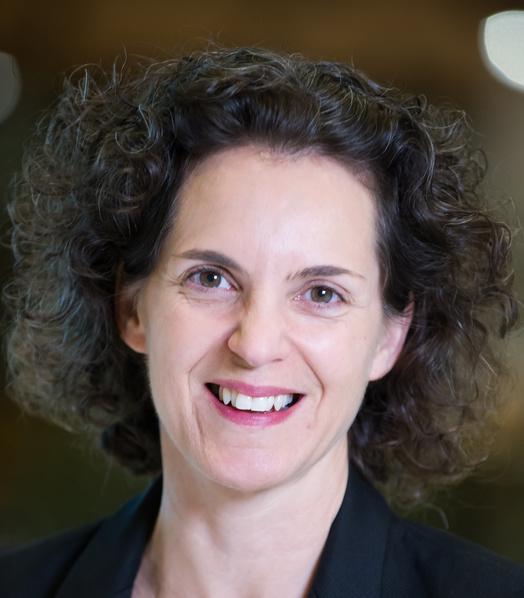
Loughborough University's Careers Network team, in conjunction with East Midlands Chamber, planned and delivered a successful sustainability project that partnered local SMEs with students. This provided paid work-based experiences for students, as well as giving organisations a valuable assessment of their current and potential sustainable business practices.
The project originated from an opportunity to partner with East Midland Chamber who, tasked with achieving regional commerce targets, have an ambition to move SMEs towards net zero Through Chambers funding, we reached out to local companies and, once their SME eligibility had been approved, carried out a full studentled sustainability audit and comprehensive report for each business, outlining their current status and potential future options
Following a university-wide recruitment programme, 34 students from a diverse range of disciplines and backgrounds, spanning first year to PhD, were selected to receive training as Sustainability Ambassadors The training ensured students understood sustainability in the context of the United Nations Sustainable Development Goals (SDGs), and more specifically the eight key SDGs the audit encompassed: energy, waste, community, procurement, biodiversity, travel, water and catering
Students were also trained in how to conduct a sustainability audit of a business, covering effective questioning, sufficient evidence gathering and guidance on conducting a business meeting which, for many, would be a first.
Once fully trained, students visited local SMEs in person to conduct an audit The SMEs involved represented a broad range of industry areas from manufacturing to healthcare and sports coaching, requiring students to adapt and apply their knowledge to each company ’ s specific operations and circumstance Each audit comprised a two-hour meeting to review the company ’ s current practices, culminating in a full 35-page report per organisation This highlighted practical suggestions, useful resources or local funding for SMEs plus areas to consider This enabled businesses to see how far they have already come in supporting the eight SDGs and find ways to continue improving
This sustainability project proved a fantastic vehicle for students to obtain real-world experience and enrich their workplace understanding. Through interacting directly with employers and organisations, they developed skills that will prove invaluable for their career, including communication in a work environment, commercial awareness, analytical skills, teamwork, critical thinking and improved self-confidence. Students who felt passionate about sustainability and expressed an interest in incorporating it into their career, found that this experience helped prepare them for tackling pressing global issues.
“I have enjoyed completing these audits and definitely benefited from taking part. I have learnt communication skills. Adapting my questions to the needs of the individual businesses and people to get the information I require is a skill I can see being beneficial in the future.”
MEng Aeronautical Engineering student, year three
Creating and facilitating work opportunities and employability skills development is a key focus for Loughborough University in preparing our students for their future careers The sustainability project helped us with this goal Several organisations provided further internship opportunities for students, including roles that focused on developing practices to improve their road towards net zero
Longer-term, partnering with East Midland Chambers and SMEs helped to build a strong rapport and laid foundations for further mutually beneficial collaborations in the future
Whilst there were some challenges, the benefits of running a topicspecific work-based experience far outweighed any issues. For future repeat projects, we would recruit more students to cover the inevitable drop-out that occurs, which impacts the number of Sustainability Ambassadors available to conduct the audits and reports. A longer timeframe would also be required to accommodate the tight resources small SMEs typically struggle with, both in terms of time to complete initial paperwork, and sufficient availability to host the audit

Having run this as a pilot scheme and seen the successful outcomes, we are keen to continue offering projects like this For any universities considering something similar, we would recommend providing work-based experiences that have a specific focus - it proved a very effective way of engaging students with real-world issues As a result, the experience gained was appreciated by students, and SMEs felt supported and enjoyed their involvement in giving students a valuable work-based experience
s.boon@lboro.ac.uk


TRACEY HILL, Employer Engagement Manager at the University of Sheffield Careers and Employability Service, outlines how the Service has taken a collaborative approach to promoting sustainable career opportunities. Working with the Students' Union, student activist groups and the wider university has enabled an honest conversation, helping to shape careers provision and effectively helping employers to showcase their work and support sustainable development goals.

Sustainability has become a pressing concern in various realms, including careers provision, sparking numerous discussions amongst organisations such as AGCAS, Institute of Student Employers (ISE), careers services and student activist groups Over the past two years, this topic has gained even greater attention, reflecting growing concerns about the climate emergency
In response, the Positive Impact Careers Delivery Group was established in 2021 at the University of Sheffield, aligning with the sustainability strategies of the Students’ Union and the university This collaborative body comprises representatives from the Careers Service, the Students' Union, the University's Sustainability Committee and the Corporate Communications Team, all working together to shape and guide careers and employability activities
Guided by the UN Sustainable Development Goals (SDGs), we are committed to empowering students to make informed choices about their future Our primary objective is to inform and enable students to contribute to positive change and a more sustainable future We strive to encourage employers to prioritise transparency and set ambitious sustainability strategies Additionally, we aim to enhance students' awareness of careers that align with shared sustainable development goals
As a group, we collaboratively organise and support sustainability events, including student-led green jobs fairs, careers talks and panel discussions We also shape our central careers fairs to ensure students are exposed to a wide range of career paths contributing to sustainability in organisations As career professionals, we acknowledge the importance students place on finding careers aligned with their values Striking a balance between meeting their needs and providing impartial support to all students is a challenge we actively navigate
Universities, including ours, have faced pressure to support sustainability campaigns like the Fossil Free Careers campaign Within our group, we often discuss the lack of clarity surrounding what defines a sustainable or fossil-free employer. Paradoxically, some of the most progressive organisations on sustainability are those with a significant environmental impact, and establishing specific, accessible and measurable criteria to assess the sustainability credentials of employer partners is very challenging. To address this, we work to empower students to identify and seek out sustainable careers by shaping the information, advice and guidance we provide.
To further our understanding and strengthen our resources, in 2022 we hired a student intern knowledgeable about the UN SDGs. The intern conducted research to explore careers and job roles that contribute to sustainable development objectives. Their recommendations have been invaluable in defining careers in sustainability and fostering a greater focus on sustainability in our work
The student voice plays a crucial role within our group, ensuring that students’ perspectives are heard and fostering healthy debates about the challenges we face We value empathy for individual causes while working collectively to achieve the goals outlined in our joint statement of intent
One of the ways we engage with students is through an annual survey that gauges their opinions on topics related to their future and environmental sustainability values The 2022 survey findings have revealed interesting insights While there is a year-on-year increase in students seeking employers committed to sustainability, the student population remains divided on certain issues
For instance, while 57 7% of respondents expressed that they would not consider working for a company primarily involved in fossil fuel extraction, 19 2% indicated that they would, and an additional 25 1% remained uncertain These findings inform our approach, for instance in highlighting career opportunities in renewable energy more prominently than those in fossil fuel extraction
Throughout our journey, we have learned several valuable lessons By jointly sharing ideas and promoting student events and activities, we have seen increased student participation Placing students at the heart of our work has strengthened our commitment to our common goal Additionally, we have witnessed an improved flow of information from employers and are working towards further enhancements in information, advice and guidance for students
Sustainability is an ever-evolving focus area and, by collaborating with various stakeholders, leveraging student input and fostering discussions, we are working to shape careers and employability activities that align with the UN SDGs Together, we can create positive change and pave the way for a more sustainable world.
t.a.hill@sheffield.ac.uk
Striking a balance between meeting student needs and providing impartial support is a challenge we actively navigate

HOLLY FOX, Employer Engagement and Business Development Manager, LUCY PALMER, Employer Engagement Officer, and AMAANI RAHMAN, Employer Engagement Intern, explain how they have put sustainability on the events agenda at the University of Leeds



Students are looking for sustainable careers that make a difference, so where do we come in? This is a question we, and many of you, will have asked ourselves Of course, we could run events that promote sustainable and green careers, but we wanted to go a step beyond that by embedding sustainability across our entire employer-led events programme and through re-examining our ways of working
After two years of online delivery during the pandemic with a negligible carbon footprint, students, employers, and careers staff were keen to return to the in-person model. At Leeds, we host up to 120 employers per careers fair and welcome 400+ employers per year on campus, so we recognised the environmental impact these events can have. To help counter this, we set key performance indicators (KPIs) on how we could make our events more environmentally friendly and implemented the following strategies:
Previously, we'd printed out a physical four-page fair guide/map for students Instead, students were encouraged to sign into our career fairs using a QR code that directed them to a digital copy of the stand plan and employer list. If we assume one in two students would have taken a print-out, we saved 5,200 pieces of paper across our two large fairs, equivalent to a 22 feet tall pine tree.
We also encouraged employers to make sustainable choices about what promotional materials to bring along, including using QR codes to share information rather than leaflets Similarly, we reduced the need for print instructions for employers on the day and provided a QR to scan to find these on their name badge
Employers were asked to bring reusable bottles and signposted to water fountains, rather than us providing single-use plastic bottles This presented a challenge as our event venue can get very hot with over 2500 people inside There were also some communication issues where our email guidance hadn’t been cascaded down to employer representatives who attended Next time, we plan to work smarter to ensure our pre-fair recommendations are getting to the right people at the right time, and water access is better signposted
The highest impact change we made was providing vegan catering across all our events, which was well received by attendees on the day We estimate that across our two autumn fairs, we saved at least 270kg of carbon or the equivalent of a car driving 1000 miles
To minimise energy usage and admin time, employers were encouraged to pay through our online store for fairs and services To incentivise this, employers paying by invoice were charged an additional fee to account for additional processing time
There's still more we can do, including incentivising public transport use and continuing to discourage employers from bringing throwaway freebies, and we will try to address these challenges for our upcoming events
As well as embedding sustainability into our events logistics, we ran a themed ‘Sustainability Spotlight’ week in collaboration with teams across the university. Our aim was to raise awareness of sustainable careers, different opportunities, and teach students about green skills while gaining insights from local sustainable companies.
Although student interest is high, feedback has shown students feel misinformed about green opportunities and confused about how to pursue them. To bridge this gap, we ran a session to show students how to search for sustainable companies, what to look for, and how to develop a profile to appeal to prospective employers. This event was a collaborative effort between the Careers Service and the University Sustainability Service, and working together was invaluable
As well as benefiting from the Sustainability Service's expertise to produce session content, our event coincided with a conference they were running the same week which enabled cross-promotion Through conversations in the planning process, we saw synergies in how our services could work closely on future events
Collaborating also allowed us to share employer contacts, networks, and ideas which contributed to the success of our sustainability-themed networking event It was the highest attended event of its kind this academic year and was oversubscribed, attracting over 100 students
To select attending employers, we concentrated on local companies to reduce the environmental impact from travel A diverse range of sectors were represented from charities to large firms While it’s challenging to assess a company ’ s sustainability, we looked at accreditations, mission statements and their environmental, social and governance (ESG) framework
Building on this success, and with our new company links, we plan to run a Sustainable Careers fair in collaboration with our Student Union and the Sustainability Service as part of Climate Change Week in 2024/25

We will continue to run our events in an increasingly environmentally conscious way and introduce more KPIs to ensure at least 25% of attending companies are sustainable, across all our events While this is tricky to define, we will focus particularly on co-operatives, social enterprises, and B-Corps to meet this KPI, and collaborate with our Sustainability Service to link with their work towards the United Nations Sustainable Development Goals to ensure representation across our programme Most importantly, we will strive for all changes we make to be sustainable
“Being involved in the week was a highlight of my placement year! I have a keen interest in sustainability, so researching companies, sustainable initiatives and green jobs was really insightful. I enjoyed communicating with different colleagues, and the experience allowed me to draw on my interpersonal skills and expand my personal network too.”
Amaani Rahman, Employer Engagement Intern
DANNY MIRZA and DEMI KING, Career Development Consultants for the Faculty of Business and Law (FBL) at the University of Northampton, outline how the FBL Challenge is equipping students with crucial real-world problem-solving skills They discuss how this unique educational approach enhances employability and prepares students for impactful sustainable careers.
At the University of Northampton, we developed the Faculty of Business and Law (FBL) Challenge, an initiative designed to put sustainable development theory into practice This project, rooted in the principles of the UN Sustainable Development Goals (SDGs), was conceptualised by our own Dr Ebenezer Laryea, an esteemed Associate Professor in International Sustainable Development Law
Dr Laryea's vision was to create a unique platform where students could apply their classroom learning to tackle pressing commercial sustainability challenges This hands-on experience aimed to provide our students with a deeper understanding of the complexity and interconnectedness of sustainability issues and inspire them to devise innovative solutions
In collaboration with the Changemaker Hub, we infused a strong employability dimension into the FBL Challenge This approach successfully created a dynamic synergy between academia and industry, positioning the FBL Challenge as a model for experiential learning and skill
At its core, the FBL Challenge addresses critical sustainability issues while enhancing student employability In an era increasingly calling for sustainable practices, such initiatives are vital in equipping students with the skills that will encourage them to become agents of sustainable change By immersing themselves in real-world sustainability issues, they gain not only theoretical knowledge but practical skills and competencies relevant to a host of careers within the sustainability sector
This year, the FBL Challenge teamed students with Blue Skies, a Northamptonshire-based fruit company with a global reach The challenge was to combat food waste, a pressing issue confronting the food industry worldwide Students had the task to devise sustainable products or services derived from the food waste generated as a by-product of Blue Skies' primary product line They grappled with the complex, real-world problem, presenting innovative and practical solutions aiming to bring about significant change
Tackling this challenge allowed students to develop a range of employability skills crucial for careers within the sustainability sector While each skill merits attention, the following competencies emerged as particularly noteworthy:

Social bricolage can be thought of as a form of creative problemsolving It requires participants to combine existing resources in novel ways to address sustainability issues In the FBL Challenge, students exercised this skill by converting food waste into useful products, demonstrating how societal challenges can be addressed through creative thinking and a resourceful approach This attribute is vital in sustainability roles, where innovative solutions are needed to address complex environmental and social problems
The students not only had to understand the scientific and technical aspects of food waste, but also to navigate business, economic and social considerations to propose a feasible solution. This task required them to draw upon a broad range of disciplines, fostering an interdisciplinary perspective that's invaluable in roles requiring a multifaceted approach to sustainability In this sense, the FBL Challenge offered students a microcosm of the diverse, interconnected world of sustainability
One of the greatest challenges of sustainability lies in communicating its importance effectively and persuasively. Throughout the FBL Challenge, students had to advocate for their solutions, honing their ability to articulate complex sustainability concepts and persuade diverse audiences. This advocacy process is a critical skill for those planning a career in sustainability, particularly in roles that involve influencing policy, shaping public opinion or driving organisational change towards sustainable practices
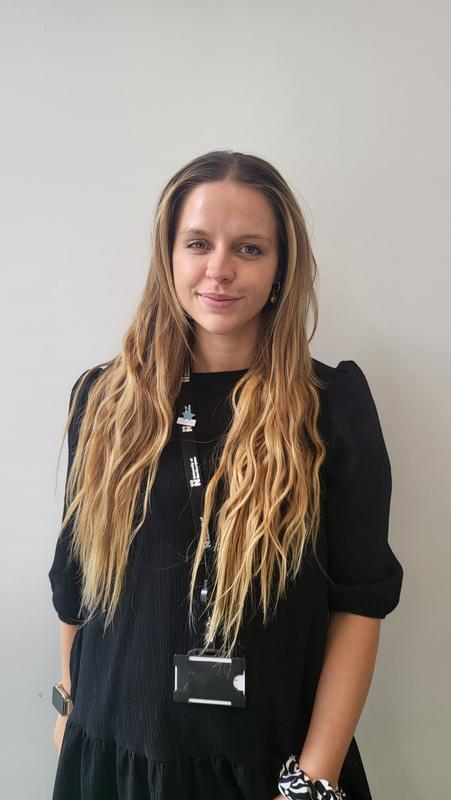
In tackling the challenge, students considered the ethical implications of business operations, fostering an appreciation for Corporate Social Responsibility (CSR) They learned about the moral and social obligations businesses hold towards society and the environment, and how these considerations should be integrated into every aspect of a company's strategy This understanding of CSR, and how it contributes to the overall sustainability of a business, is a key competency for careers in sustainable business development and management
By taking part in the FBL Challenge, students learned the fundamental concept of circular economy This is the idea of keeping resources in use for as long as possible, extracting the maximum value from them, and then recovering and regenerating products at the end of their service life The students’ task was to devise a sustainable product or service out of food waste, by thinking about circularity
This practice requires a significant paradigm shift from the conventional 'take-make-waste' linear model to a 'reduce-reuserecycle' approach The mindset students developed during this challenge – envisioning waste as a resource, finding ways to reduce waste, reusing resources and recycling materials – is an essential skill set for any sustainability-focused career Whether they pursue roles in sustainable design, waste management, resource efficiency or policy-making, the ability to think in circular terms will be highly beneficial This circularity approach not only mitigates environmental impact but also uncovers new economic opportunities, embodying the win-win scenario at the heart of sustainable business practices
Looking to the future, the FBL Challenge is a testament to the powerful synergy of academia and industry in equipping the leaders of tomorrow. Echoing the sentiments of Hugh Pile, CEO of Blue Skies,
"The partnership has delivered all that you would expect from a strong academic institution – superb research, progressive thinking, rigorous detailed analysis – but it has also been deeply commercial, offering practical solutions and use-cases applicable to our day-to-day operations "
As sustainability becomes a non-negotiable element of every sector, initiatives like the FBL Challenge are crucial in fostering a workforce capable of addressing global sustainability challenges and creating a future where people and the planet can thrive

Through running the FBL Challenge, we have found that students greatly value the hands-on opportunity to apply theoretical knowledge to real-world problems The initiative has allowed students to comprehend the complexities of sustainability issues beyond the confines of a traditional classroom setting, fostering a deeper understanding of the practical application of sustainable practices Moreover, the experience of working closely with industry professionals and crafting innovative solutions to genuine business challenges was instrumental in shaping students’ career aspirations and enhancing their readiness for the sustainability sector
Danny.mirza@northampton.ac.uk
Demi.king@northampton.ac.uk
Connect with Danny on LinkedIn
Connect with Demi on LinkedIn
The FBL Challenge is a model for experiential learning and sustainability skill development
Students greatly value the hands-on opportunity to apply theoretical knowledge to real-world problems

The tensions we juggle in career development work come from our position at the intersection of individual and societal concerns This reflects the same tensions as the dominant socio-political ideologies of the day Nowhere is this shown more clearly than in the struggle between the need to find work in the here and now and concern for the future of the planet
This is deep stuff: for today's graduates, the existential nature of the climate emergency brings together a powerful clash of activism and despair, of hope for a fulfilling personal future and hopelessness about the future of humanity Here, we seek to integrate this with a further concept that informs our work, that of ‘calling’, and see what it means for our ways of enacting sustainable career development
Since Peter Plant first articulated the importance of green guidance, careers researchers and practitioners have argued for a broadening of perspective to 'sustainable career guidance' (Di Fabio & Bucci, 2016; Pouyaud & Guichard, 2017; Dimsits, 2022) which supports 'career development that meets the needs of the present without compromising the ability of future generations to meet their own needs' (2021) This is vital for invoking the UN's sustainable development goals (SDGs) for individual career action By viewing the 17 SDGs, the career development professional can invite global, societal and ethical perspectives into careers work with graduates looking for meaningful ways to unite skills, competence and livelihood

concepts
in the careers world
The motivation for many students to pursue sustainable careers relates to deep-seated matters of personal vocation or 'calling' – a concept which has extended from Judeo-Christian religious roots to become widely understood as the meaning and purpose we find in work In fact, 'calling' features extensively in the scholarly literature on careers and is much researched and debated It is even the focus of one module offered by the Career Studies team at Warwick, where we look at integrating it with a career development focus on wellbeing, happiness, values and subjective career success We also connect it to clients' potential draw towards sustainable careers
Definitions of 'calling' encompass both a person's inner drive and process of self-actualisation and motivations of duty and service As people perceive, enact, hone and live out a calling in a variety of contexts, career development practitioners can support them in crafting scenarios which meet their needs Studies suggest that people who self-describe as having a calling are happier at work, and employers value people with callings, with reports of greater commitment and productivity – so it can look like a win-win
Work must be sustainable in more ways than one
There is a dark side, however, to this level of work commitment: it can lead to perfectionism and overwork and make it harder to manage adverse or stressful work events If a calling can't be followed, or a lived calling goes wrong, how do we respond?
It also plays into situations where a calling traps people in contexts with poor conditions, and perhaps enables employers to neglect staff wellbeing: very committed staff may work for low (or no) pay, removing at least one driver to improve conditions The realities of this are played out in contemporary industrial relations, as well as evidenced in numerous studies (Bunderson and Thompson, 2009; Schabram and Maitlis, 2017)
This requires ethical consideration of the career development professional’s role in helping students balance their calling to sustainable careers On the one hand, we encourage this human drive towards a societal goal outside of the individual, but pursuing this career goal must never be at the expense of individual autonomy, humanity and compassion

The green transition in the labour market sees employers and organisations looking to gain the competitive advantage, through recruitment of a properly qualified workforce. Recruitment strategies are then often led by new positive sounding ‘greenwashing’ narratives on how your career in this company will be particularly green and sustainable. The risk here is that these narratives are uncritically and seamlessly adopted by graduates and other professionals.
This turns political matters to the personal for us. Is a call to a purposeful career contributing to sustainability? Or is it a masked exploitation of individuals’ good, ethical and socially responsible intentions? It is important to discuss whose interests are being served, what forms of society are offered to the labour force in these greenwashing narratives and ask if these are socially just ways of working and living
One of the UN SDGs is for decent work for everyone, referring to quality and dignity in work and respecting the rights, safety, and equality of workers Even with a calling, precarious and exploitative working conditions such as unpaid internships, long hours cultures, increased workloads and devalued pay are not sustainable
We owe it to our activist-oriented students to discuss these matters with them We can't pre-determine the job roles that contribute to sustainability: knowledge constantly deepens, and technology develops to handle sustainability challenges Sustainable career guidance must support users in learning to explore and examine how their career can contribute to sustainability and to encourage this as a lifelong task, as the labour market changes
As part of this, we can work with students to help them reframe their thinking and find how they can support and advocate for sustainability We can also encourage them to and consider what they need in order to work sustainably
Students drawn towards working in sustainability may need help to see themselves as part of a wider movement, and to understand that their work must be sustainable in more ways than one Sustainable careers work will enable career development practitioners to maintain autonomy, freedom and decency as we work to save the world
We can encourage students to consider what they need in order to work sustainably

LAURA GUNAY, Enterprise Adviser at Newcastle University, CAROLINE BALDWIN, MSc Careers Manager at the University of Bath, and LIB GOLDING, Enterprise Educator at the University of Liverpool, discuss the Sustainable Business Challenge This annual enterprise challenge, delivered globally, online and across six institutions, helps students gain insight into sustainability and connect with sustainability focused employers. The finessed delivery model embodies sustainable practice and is ripe for replication
The Sustainable Business Challenge ('SBC') is an annual, fiveday cross-university event that has run since 2019 Students work in teams and use design thinking to address a sustainability-related challenge set by an external sponsor Teams collaboratively ideate, develop and pitch a potential solution that fits with the United Nations Sustainable Development Goals (SDGs)

This year's SBC saw 120 students from six universities working on a challenge set by the UN SDGs Action Campaign and the NGO 'Action for Sustainable Development' The challenge topic: how to enhance engagement with the SDGs amongst university students
The SDGs are at the heart of the SBC, providing the focus of the challenge provocation In previous years, students have been invited to create a responsible,innovative initiative which would help the food and fresh produce sector become more sustainable We have also asked students to select an SDG they are most interested in, to encourage passion-led problembased learning The SBC is open to all students, of any stage –emphasising that sustainability is relevant to all This year we had equal proportions of undergraduate and postgraduate students participating from all degree disciplines
University organisers meet monthly from October to February to agree logistics Each university is responsible for: advertising and selecting 20-25 students (recruited according to their strategic aims); sourcing five business advisers; and running one element of the student-facing activity (live workshops, teaching materials, client liaison and student administration)
All students are grouped into teams of six (one from each university, with a mix of courses and degree level) and added to a dedicated Microsoft Teams channel managed by the host university From here, they can communicate with their team and the challenge organisers, as well as access asynchronous teaching materials on idea refinement, market research, the business model canvas and pitching

During the live kick-off session, the sponsor sets the challenge and students undertake idea generation exercises In the live finale, students reflect upon the impact of the initiative on their skill development and career thinking, while shortlisted teams deliver an elevator pitch before an overall winner is selected
Teams meet with three business advisers who offer guidance and feedback on the students’ ideas
The business advisers come from a wide range of backgrounds and nationalities, so teams get a variety of perspectives
The challenge supports the development of professional networks
The SBC began in 2019 as a collaboration between four universities (Newcastle and Liverpool in the UK and Groningen and Vrije in the Netherlands), looking to develop an international extra-curricular programme on sustainability and entrepreneurship
Initially an in-person activity, in 2021 the SBC moved online Originally a temporary solution, this model proved to be so successful – as well as cheaper and more sustainable – that we retained it It has meant we can collaborate with a much broader range of partners (the University of Bath and University of Cape Town have joined) and no longer require a budget, as there are no direct costs apart from staff time
The online solution also addressed the challenge of timetabling activity across different year groups, courses, and universities, as students now engage with learning materials and their teams asynchronously Running the SBC over a weekend mitigates academic clashes too

The business advisers represent a range of industries and sectors, including large private corporations, SMEs and notfor-profits, exposing students to a range of organisations and highlighting sustainability as a focus across industries – not simply within the environmental sector The online model also allows access to a wide and international range of employers
Feedback indicates that the SBC supports the development of professional networks, as well as increased awareness of career options and the role of sustainability across industries and sectors Students also develop in-demand skills and attributes including problem-solving, creativity, collaboration and global citizenship
Some of my ideas catered to a more British mindset, so being able to work with others from the Netherlands and South Africa helped to see things from their perspective and change my ideas to make them more inclusive.”
The SBC provides a catalyst for enhancing participants’ interest in entrepreneurship and unlocking entrepreneurial intent, due to the authenticity of the problems explored Their ideas can also impact beyond the SBC: the 2023 winning team has been encouraged to establish university arts festivals to celebrate the SDGs, and a runner up at Newcastle is now working with their careers service to progress their idea
“The SBC empowered me to take risks that I would have otherwise avoided. If you're looking to develop your entrepreneurial skills and don't know where to start, the SBC is a great way to learn those skills and put them into practice. You'll come out feeling more confident about yourself and more informed about the realworld challenges we are facing, which will look great to potential employers.”
SBC participant, 2023, University of Liverpool
Running the SBC online allows us to deliver a unique employability and enterprising opportunity to a large, cross-institutional and global student cohort, in a sustainable way The online model has allowed collaboration with diverse employers, recruitment of large student numbers and partnership with additional universities We welcome further collaborations with interested partners, both universities and employers, who would like to join us in developing and delivering the SBC sustainably
Laura.Gunay@newcastle.ac.uk
goldinge@liverpool.ac.uk
Cpb22@bath.ac.uk
“I loved the international aspect of the challenge.

Learn, hone and augment your knowledge and skills, while extending your professional network.
For the entrant, with 0–2 years ’ experience, we have
Employability Advice as well as our Introductions series, which covers:
Advice
Guidance Interviewing
Employer Engagement
andData.
For the established, with 2–5 years ’ experience, expand your knowledge, confidence and toolkit with courses including:
Work-Related Learning in HE
Recruitment Practices and Talent Management: Bridging the Gap Group Work

Career Coaching (Information, Advice and Guidance)
And for the experienced, with 5 years and more, consider:
Guidance Refresher
Leadership Refresher
Management of HE Careers and Employability Services
Employability and Career Development Learning. and Guidance Skills (Advanced). and
We also have cross-cutting courses which are relevant to ANYONE, however long you have been in your role Join:
Writing for Impact
Technology-Based Career Learning and Provision
Challenges of Careers Work in HE and and keep an eye out forWorkshops.
With prices for Full Members starting at £40, you’ll find training wherever you are on your Professional Pathway, wherever you want to go. For further details, view AGCAS Training and Conferences.
Pursue your Postgraduate Qualification in Career Education, Information and Guidance (CEIGHE) delivered by the University of Warwick and AGCAS

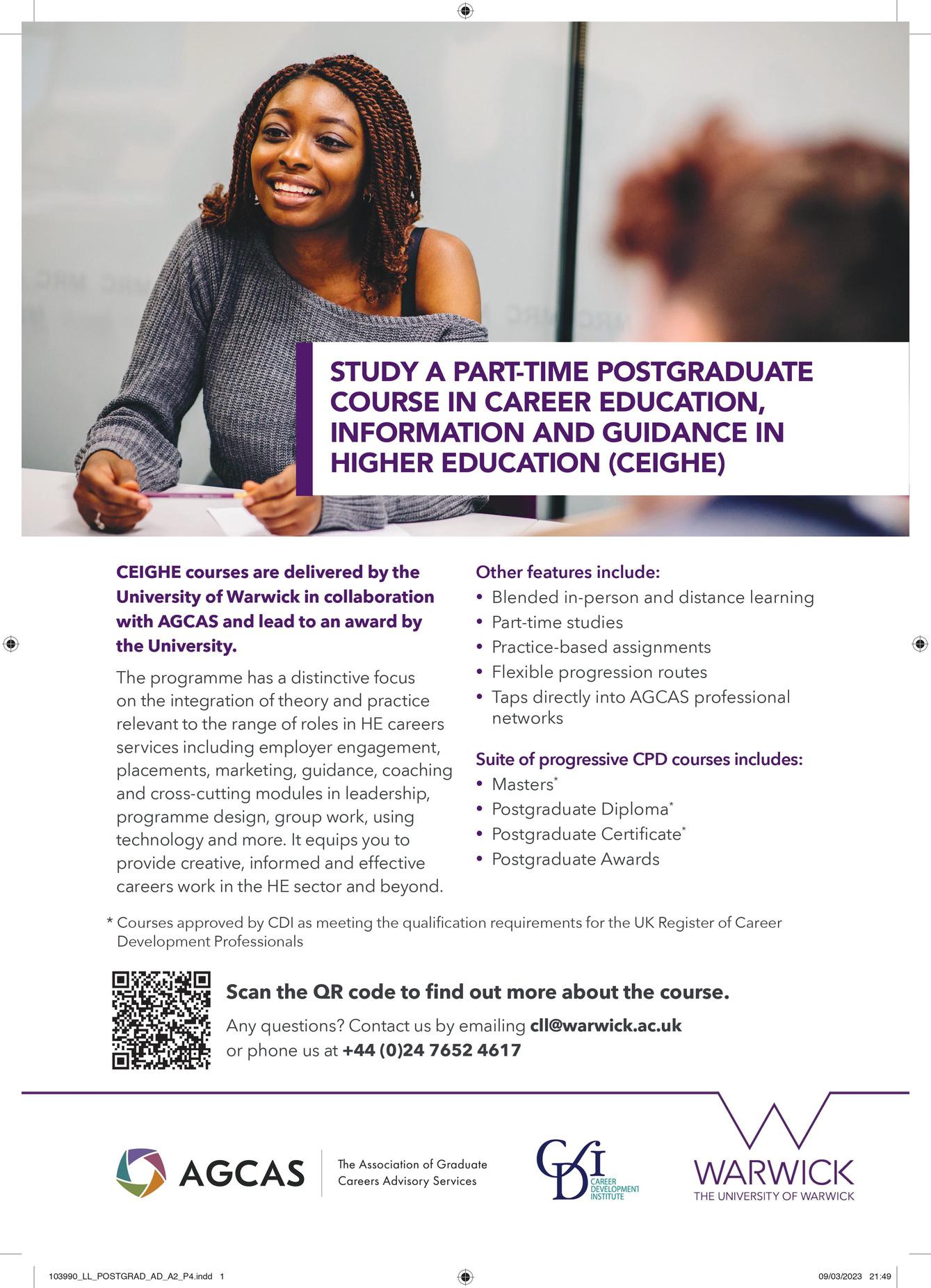
REBECCA CLIFF, Employer Engagement Marketing Officer at Nottingham Trent University (NTU), outlines how NTU is creating
sustainability champions through embedding employability in-curriculum and equipping businesses to nurture sustainable talent. She explains why embracing sustainability across all stakeholders is key to achieving the university’s ambitious green goals.



NTU is the second most sustainable university in the world and has ranked as a first-class university in the People and Planet University League for over ten years Embracing Sustainability is a strategic priority across the university The Employability team holds an influential position to drive the change to fulfill this priority, curating
“ an intergenerational conversation with our students, colleagues, and stakeholders”
Steve Denton, NTU Chief Operating Officer and Registrarexplains:
“Our Employability team puts significant effort into working with both students and employers to collaborate in finding sustainable solutions to global challenges. The team encourages our students to share with employers their commitment to and understanding of sustainability, and how it can contribute to improved productivity as well as sustainable practices within a range of sectors There is a growing demand from employers for sustainability experience and skills in today's evolving job market, and it’s great to see our employability team - and NTU students - leading the change ”
NTU has ambitious and challenging institutional targets towards our green goal Specialist departments including the Sustainability Team, Green Academy and Sustainable Futures Research strand ensure sustainability is incorporated throughout operations, teaching and research
We have developed a Net Zero Carbon Supplier Tool with NETpositive Futures, to help businesses reduce their carbon emissions. By using this free procurement tool, suppliers can generate a personalised carbon reduction action plan, which helps us to improve the accuracy of our own carbon reporting. This tool has launched with approximately 250 suppliers and was shared with the higher education sector in June 2023.
The NTU Green Rewards app is a joint venture between NTU and Nottingham Trent Students' Union Staff and students track their green actions and sustainable behaviours across themes including food waste reduction, sustainable travel and reducing their personal carbon footprint
Recently, first year Psychology students have collaborated with the Sustainability Team to devise recommendations on improving the university’s waste segregation, introducing the Bin It Right campaign. This assessed work-based learning activity has allowed students to view sustainability as a potential career option.
In the School of Architecture, Design and the Built Environment, 61 students worked with Derbyshire-based brand Alpkit to calculate the carbon footprint of a popular product and make it more sustainable. As a result of the project, NTU helped Alpkit cut the carbon footprint of their bestselling tent by 31% and accelerated the brand’s focus on data-driven sustainable design.
“Working with NTU’s student consultants gave us access to invaluable Life Cycle Analysis tools and an extensive knowledge base we don’t usually have access to. The focus in the outdoor industry has mainly been on making products as light as possible, whereas the students thought outside the box.”
Rowan Williams, Senior Product Developer at AlpkitMore broadly, the Sustainability Employability Award includes NTU’s Sustainability in Practice online course By taking part, students learn to recognise the alignment of their academic discipline to the UN Sustainable Development Goals (SDGs)
Through interdepartmental collaboration, the Sustainability in Enterprise (SiE) project has supported 218 local SMEs on their journey towards net zero. Following funding from the European Regional Development Fund, the project has enabled local businesses to understand, measure and reduce their carbon emissions – resulting in an estimated annual carbon reduction of 1000 tonnes
Employability's Sustainability Community Lab (SCL), an element of the SiE, has equipped recent graduates with sustainability knowledge and practical tools to drive change within their organisations Formulated in-house by the Employability team, the content and delivery of the SCL was informed by students and graduates through focus groups and insights from employers The programme comprises a series of workshops, featuring interactive learning activities and peer networking to foster knowledge exchange
The SCL is now complete, having engaged 72 businesses who have evidenced their commitment to sustainability by enabling 84 early careers participants to invest their time into the programme 100% of the organisations' Line Managers/Directors would recommend the SCL and encourage more businesses to send their early career professionals on the programme
“I strongly recommend participation in this programme. Not only did it increase our graduate employees’ knowledge base, through dissemination amongst the whole company and a commitment to regular ideas sharing, the Company Sustainability Policy has been significantly enhanced and adopted by all.”
Steve Strickland, Director of Hazid TechnologiesWe are now developing a regenerated SCL, supported by funding from Nottingham City Council The Innovation Community Lab will draw on experiences learned through delivering the SCL, using the United Nations’ SDGs as a foundation for graduates to innovate sustainable practices into their business
The SDGs are also pivotal to the design of our new Employer Toolkits Structured to equip all businesses to attract, select and keep their early careers talent, these resources will ensure employers are considering, as well as implementing, sustainability at all stages of their recruitment processes

Looking ahead, the Employability team will be championing sustainable recruitment practices, through collaboration and signposting to Sustainable Recruitment Alliance (SRA) guidance As recent signatories to the SRA, we have identified opportunities to educate our employer partners about the importance of considering sustainability when attending our careers fairs We are redesigning marketing communications and scoping how we can collect data from suppliers and attendees to measure the sustainability impact of travel to recruitment events
For staff, the development of a new offer to improve climate literacy will see continued advocacy for sustainability across the university For the next generation of graduates, plans are underway for a Student Sustainability Summit in November 2023, which will showcase sustainability and employability, with a particular focus on educating and enabling students to make informed decisions around their future careers
Sustainability Team: sustainability@ntu.ac.uk
Working with NTU Employability: talent@ntu ac uk
Connect with Rebecca on LinkedIn
CERIS PALSER, Careers Team Manager at Cardiff Metropolitan University, outlines how the career service is preparing students and graduates for sustainable career opportunities in partnership with electric racing series Extreme-E

At Cardiff Metropolitan University (Cardiff Met), we have been ranked as the best UK university for sustainability in People and Planet's Green League 2022/23 Our careers service is at the forefront in preparing students and graduates for sustainable career opportunities by showcasing first-hand the effects of climate change and how they can directly influence the future of their industries Alongside my role as a Careers Manager, I’m also a freelance events professional with a passion for inspiring the next generation to share their knowledge and understanding of sustainability This is vital for the longevity and future of our industry
In 2020 we exclusively partnered with Extreme E, a unique electric motor racing series, who host international sports championships to highlight the climate change challenges faced by different ecosystems By racing in areas impacted by environmental changes, they promote clean mobility and other sustainable solutions A Scientific Committee works alongside the Championship to ensure that there is measurable positive impact left in each community

Extreme E provide short placements and insights into freelancing to small numbers of Cardiff Met School of Management students. Students apply and interview for places, with School of Management academic staff shortlisting and selecting the successful students. Each placement usually attracts around 20 applications, and over the past three years, 18 students and graduates have benefited from work placements with Extreme E.
They have worked in incredible locations from the Arctic in Greenland through to Saudi Arabia, Sardinia, Chile and the UK. The Extreme E work placement is open to students at all undergraduate levels and at Masters level
Numbers are small as placements can be in very remote and challenging locations with basic facilities Students must be confident in their ability to work within the setting The wider cohort benefit from the partnership through in-curriculum theory and planning sessions, and from feedback which informs future placements
Extreme E deliver career talks available to all students, with Operational Managers discussing their own career history and providing advice on how to break into competitive events industries. Extreme E staff share information on hosting and delivering international events. Students are encouraged to follow and connect with relevant team members as a mentoring experience.
On returning from Extreme E work placements, participants discuss their experience and learning with fellow students as part of their department plenary sessions They are also encouraged to share relevant information as part of their learning modules, linking theory with practice
We have recently extended the Extreme E partnership opportunities to students studying sustainability pathways This is to align with the university’s sustainability agenda and ensure we are encouraging interdisciplinary working, providing a wider base for shared knowledge and connections
It is a real game changer for students to see how sustainable events are managed

Extreme E has the lowest carbon footprint in motorsport We support Extreme E’s legacy programme by capturing all of Cardiff Met’s event travel for carbon reporting The Extreme E team transport all their race cars, event infrastructure and operational equipment using sea freight This is less carbon intensive than air freight, using 75% less CO2, and the ship also provides accommodation during the races and is home to a scientific laboratory
Following a recent championship in Scotland, over a thousand native trees are being planted to protect the eroding banks of the River Nith This is part of Extreme E's environmental legacy programme and offsets carbon from unavoidable event travel
As a freelance consultant, I advise on the operational aspects of the event, ensuring students are part of the process whilst on site. Students learn from this expertise and input into event decisions. Whilst on site, students collectively agree with the company managers how each day will be delivered. The students’ breadth of experience from other placements and work experience benefits this work.
"I
with the Extreme-E hospitality manager about the aims of the company and how they split focus on marketing, sustainability and profitability. I really appreciated their attention to detail within the design of the venue, using local suppliers.
It is a real game changer for students to see how sustainable events are managed It is essential that the events community educates the next generation of events professionals and encourage them to work sustainably Events are traditionally highly wasteful, involving a lot of disposable materials, but Extreme E work placements are educating events managers of the future that events can still be amazing without impacting on the environment A recent Cardiff Met graduate now works on the entire race series as a freelancer, experiencing a different aspect of the operation at each event to broaden his experience
We will continue to partner with Extreme E in their endeavours to highlight change in the industry, and we will keep influencing the way their events are delivered Through broadening our students’ outlook on the events industry, and sharing the latest academic research and developments in sustainable events with Extreme E, this partnership is successfully striving for change and setting our students up for sustainable careers
Marios
Extreme E use domestic caterers, with all equipment, staff and produce coming from the countries they race in. They avoid disposables and recycle unavoidable waste. They ask caterers to commit to reducing single use plastic not only at their events but across their business, leaving a positive legacy. Extreme E are increasing the number of plant-based dishes and souring sustainable ingredients that leave behind a smaller carbon footprint. Left-over produce is donated to local organisations to avoid waste
got to have discussions
I also got the chance to network with potential future employers and experienced industry specialists. This was an amazing insight into the hospitality of an extreme motorsport event while taking actions to maintain environmental sustainability.”
Miaris, BA (Hons) International Hotel and Hospitality Management, Year 1
“Everyone brings their own cups, plates and cutlery, reducing the catering waste. The organisation reuses and owns their furniture and tents, ensuring less waste with each event. I really am blessed to have experienced working within an event that strives for a better world!”
Cerian Swain, BA (Hons) Event Management, worked at the Scottish championship and has been offered work experience in the next round of the championship in Sardinia.

WILL SPEAKMAN, Programmes Coordinator for the Career Lab programme at the University of Sussex, highlights how the introduction of a brand new ‘Green Futures’ event and accompanying internship scheme is helping students from all academic backgrounds to prepare for sustainable careers

ws247@sussex.ac.uk
Our new Green Futures programme, an all-day event and accompanying internship scheme, aims to support students from all academic disciplines to begin their sustainable careers Through this event, we intended to showcase the variety of career pathways on offer and to assure students who don't necessarily study an environmentally-focused degree that securing a green graduate job is achievable Working collaboratively with our internal and external partners was also vital to make sustainable work experiences attainable to as many of our students as possible
We wanted to engage all students, regardless of their skillset, experience or academic discipline
Proposed by the management team, Green Futures originated primarily as a result of the growth of green jobs in various sectors, but also from a change in student attitudes towards pursuing more sustainable careers This event aimed to provide students with a better understanding of sustainable career opportunities, regardless of their skillset, experience, or academic discipline All current students were invited to apply, with those in Access and Participation Plan (APP) groups prioritised Giving students from underrepresented groups priority to such events is central to the Career Lab programme, therefore we saw this approach as delivering multiple benefits for our students
The all-day event was split into four distinct sections Firstly, students heard from a panel of experienced professionals all currently employed in sectors identified as growth areas for green jobs. Here, the panel speakers outlined the most sought-after skills their organisation look for when hiring graduates, where to look for green jobs and how to entice investors for green startups. Next, students participated in mini consultancy challenges, giving them an insight into the real challenges our panel members face every day. After a break for a vegetarian lunch, students heard from a panel of recent Sussex graduates who gave insights into a variety of sustainable career pathways. This panel was vital in setting the scene for our current students, as they shared the challenges they faced to get where they are now and emphasised the importance of networking. To conclude the day, Sir James Bevan, then Chief Executive of the Environment Agency for England (and Sussex alumnus), spoke about his career journey and the importance of collaboration when tackling the climate crisis His career demonstrated the versatility of the green jobs market and echoed a recurring theme throughout the day that a multidisciplinary workforce will be crucial in fighting climate change
To maximise engagement with students from all disciplines, we invited speakers from a broad range of sectors such as travel, energy, technology, and local government. This was advertised to students from all schools of study, not just those whose degrees are specifically concerned with the environment. Gaining insight from such a wide selection of viewpoints was particularly valuable here, as it informed attendees that there are multiple ways to secure a green graduate job, and these can differ depending on the organisation or sector Furthermore, several of the mini consultancy challenges underlined the importance of helping all students prepare for sustainable careers One notable discussion for example was led by the Director of the Knepp Wildland Foundation This group examined the Weald to Waves project run by the foundation, a large-scale approach to rewilding that will involve connecting numerous privately owned areas of land A project like this wouldn't be possible without a multidisciplinary approach, and drawing on expertise from areas such as law, business, ecology, and planning will be essential
Those who applied or attended the event were also given exclusive access to our brand-new Green Futures Internship Programme. Funded by Santander Universities UK and the University of Sussex, these paid internships involve working in a role or for an organisation where sustainability is a priority, ensuring those with little or no work experience can take a crucial first step on their sustainable career pathway. We felt it was important to include roles from a range of sectors here to ensure maximum participation from all students. Secured internships include an environmental social enterprise intern for Community Wood Recycling, a marketing intern for the sustainable delivery service Zedify and a community energy project officer for Surrey County Council.
"I greatly enjoyed the Green Futures Event. The panels were insightful, and the range of expertise and depth from varying fields were extremely helpful for me to gain a broader view of what opportunities are out there."
Student participant
As well as the Green Futures internship scheme, the Career Lab team also runs the UK summer internship and student consultancy programmes Internships and consultancy challenges with a sustainable theme are particularly promoted to improve their visibility to all students Our entrepreneurship team has also made excellent progress in supporting students to launch sustainable startups including supporting the Pitch for the Planet event This Dragon's Den style competition offers £30,000 to students promoting ideas that can help maximise sustainability at Sussex Our Careers and Entrepreneurship department is very proud of the impact we are having on making the university more sustainable, however, none of this would be possible without the assistance of our internal partners For example, the Careers and Entrepreneurship team have recently been working closely with the Students' Union Sustainability Committee and the Sustainability Team to introduce a new ethical careers policy
This is the first year Green Futures and the internship programme have run, and we want to further build on its success next year through hopefully sourcing more internships and an even wider range of panel members We did face several challenges in organising this event, primarily with securing all panel members on the same day Giving ourselves plenty of time to respond to these surprises was essential Ultimately, inspiring students from all disciplines has been central to our approach Not only is this due to the emergence of green jobs in a variety of sectors, but also because the challenges faced by those tackling climate change will require an increasingly multidisciplinary attitude We will therefore continue with this approach not only for the benefit of our students' careers but also for the benefit of the sectors they choose to work in
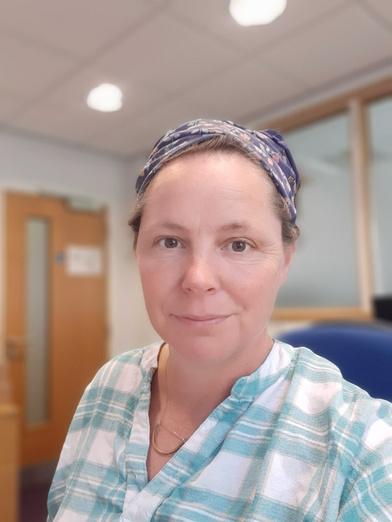
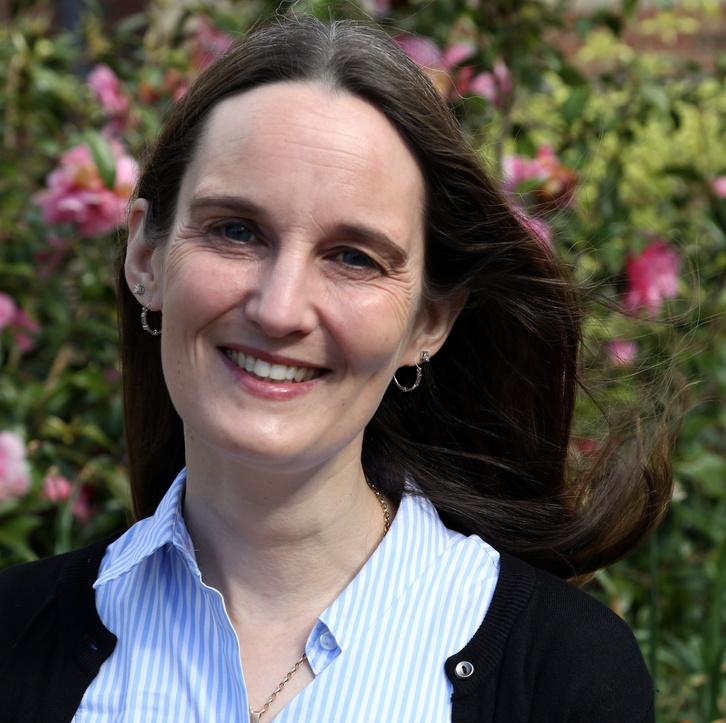
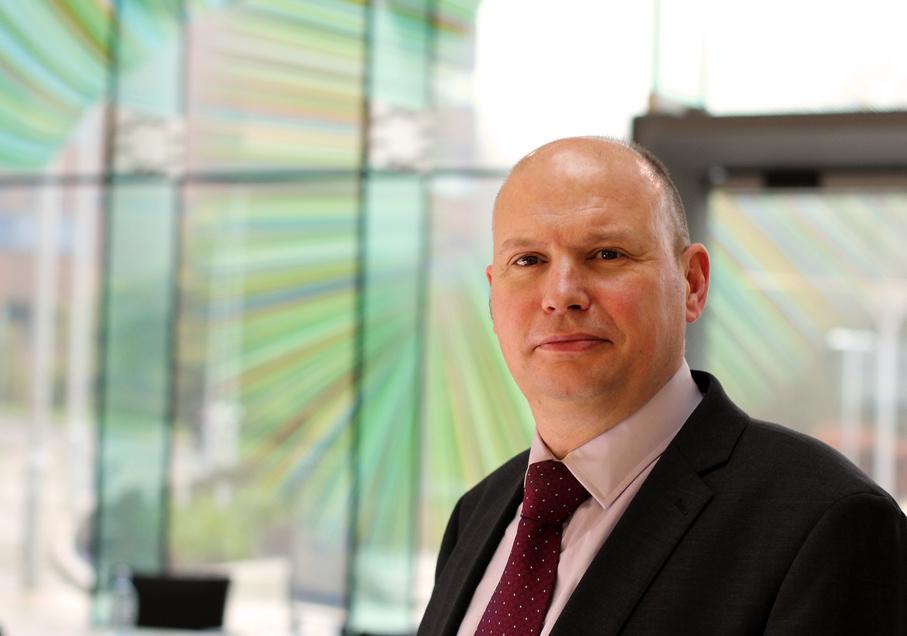
PAUL BLACKMORE, Divisional Head of Student Employability and Academic Success, DAWN LEES, Student Employability and Development Manager, and HELEN HICKS, Programme Officer at the University of Exeter, discuss how they have embedded sustainability as a golden thread within their service In this article, they spotlight the Green Consultants programme with its role in developing skills, awareness and career opportunities in the sustainability space
At Exeter, we immerse our students in sustainability issues from day one Our bespoke, targeted extra-curricular initiatives such as Grand Challenges, ringfenced sustainability-related career opportunities for disadvantaged students, and our Create Your Future programme for all first-year students are just some examples of how we help foster sustainability awareness and encourage students to make a meaningful contribution to society
We simultaneously map relevant Sustainability Development Goals (SDGs) to all modules and to our careers and employability portfolio We won the AGCAS Sustainability Impact Award 2023 in recognition of our wide-ranging efforts
As curators, gatekeepers and contractors of opportunity providers, we have a unique opportunity to impact the wider world for the better, both regionally and globally Working directly with the UN and intermediaries such as the School for Social Entrepreneurs, we reach out and support SDG-focused organisations and socially disadvantaged groups through our students, networks and global partnerships
We've reduced the carbon footprint of our Global Leaders experiences by 95% by replacing our long-haul destinations with both short-haul programmes (also using the Hague 'City of Justice and Peace' as a hub) and adopting digital-first approaches, which include Heritage Conservation themes run remotely from India This in turn has enabled us to improve cost-efficiencies and increase the number of related opportunities available for our students and those who benefit from our programmes Read about all our student-facing sustainability opportunities
Students report feeling under pressure, believing they are expected to solve the climate crisis Subsequently, embedding sustainability content into academic modules increases this eco-anxiety Addressing this challenge, Green Consultants provides an extracurricular opportunity for students to take action, while developing new professional skills The programme is flexible and students can engage as much or as little as they want, test ideas, dip in and out and progress if and when they choose
The programme is composed of three elements First, students are trained to work as a sustainability consultant and acquire a variety of transferable and technical skills Then, they work in groups for the University’s Sustainability Team to deliver real projects on campus such as ‘Anthropogenic impact on biodiversity and wildlife on campus ’ . Finally, students may undertake a week-long internship with an external organisation. The students, of course, gain valuable work experience while improving the host organisation’s sustainable practices.
Originally designed for a maximum of twenty students to complete all three stages, with training delivered face-to-face, we relaunched the training ‘online’ in September 2021. Since then, more than 400 students have engaged and nearly 250 have completed the training.
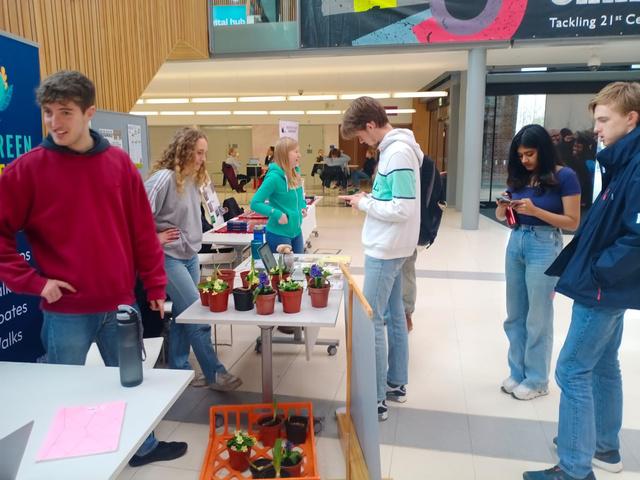
“I felt like I was doing something I’m passionate about, while also doing work that could genuinely help the environment if my research is implemented into my employer's digital practices.”
BA (Hons) English student
Students have a general lack of awareness of sustainability employment opportunities Through a bespoke LinkedIn group, we promote opportunities and engage with alumni in the sector Managing employer expectations is crucial and the skills shortage in the green sector can mean their expectations of student interns i unrealistically high, so we work with them to develop achievable objectives
Additionally, due to our rural locations in Exeter and Falmouth, employers can be challenging to access by public transport, which can limit internship choice for our students By transitioning the training online, we ’ ve scaled up student engagement, skill development and decision-making for their post-graduation career paths Notably, graduates from the programme have secured roles such as Graduate Sustainability Consultant and Solar Specialist
Our Green Consultants programme provides access to sustainability initiatives to students across all disciplines and year groups. It promotes the university's net zero ambition, and facilitates student internships with a range of organisations, spreading knowledge and skills throughout the community.
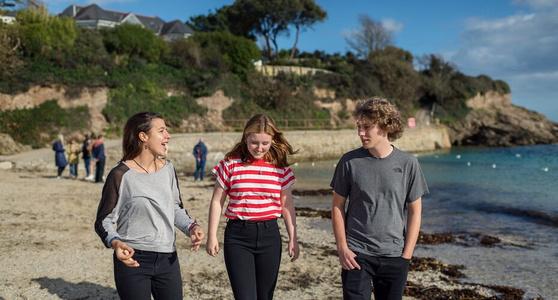
the
Our sustainability work is influenced by the increase in value-driven career aspirations expressed by our students These can be observed in the following statistics sourced from the University’s High Fliers survey in June 2023:
35% of our finalists seek out employers who are 'environmentally responsible'
41% look to secure a job that allows them to 'give something back' to the community
48% seek employers committed to diversity and inclusion
88% of Exeter students say that sustainability education is important (internal survey, June 2023)
Our internal analysis suggests over 90% of graduates who completed our SDG-related Access and Participation Plan 'Progression' programmes secure graduate-level employment. This evidences how our remit to improve the career prospects of all our students can be achieved whilst simultaneously meeting their desire to increase their sustainability literacy and deliver positive impact, benefiting society and the environment.
We continue to enhance sustainability literacy by measuring against key metrics and associated 'learning gain', including graduate destinations aligned to SDGs, and foster career ambitions and sustainability impact among our students and graduates.
Our work is now further aligned to the institution's 'Strategy 2030', which aims to prepare students to be active global citizens, making a positive impact on the world through international teaching, learning and employability opportunities
Connect with Helen on LinkedIn
We immerse our students in sustainability issues from day one
“We are proud to have teamed up with
University of Exeter to help communicate our new environmental strategy… Lily’s contributions helped us create a marketing campaign (for residents).”
“Both of our interns have been absolutely amazing to work with. I find their enthusiasm and passion for sustainability inspiring and encouraging. Thank you for the work you are doing with these young people and we look forward to our continued participation.”
We are addressing the challenge of student eco-anxiety

HELEN HOOK, Enterprise

at Careers Network, University of Birmingham, outlines how EUniWell, a European University Alliance, provides opportunities to prepare
To support their aims, CCI asked our students to design a social media campaign to explain the concepts of climate cooperation, climate club, carbon pricing, and climate finance, to establish a large social media community and to connect with other societies, organisations, activists, and politicians. students for sustainable careers whilst supporting global sustainability agendas.
EUniWell unites 11 universities across several European regions in a cross-sectoral, interdisciplinary, knowledge-based perspective The members of EUniWell have come together to take an action-oriented response to the wellbeing, educational leadership and civic engagement challenges set out by the Council of the European Union and the OECD (2019)
There is a strong focus on delivering sustainable and meaningful changes to the wellbeing of students, staff, and partnerships with societal stakeholders. EUniWell's core mission is
“to understand,
improve, measure, and rebalance the well-being of individuals, our own community, and society as a whole based on our joint values –democratic, inclusive, diverse, research and challenge-based, interand transdisciplinary, entrepreneurial, and co-creational”.
Colleagues from Cologne, Birmingham, Nantes, Leiden and Linnaeus agreed to collaborate on the design and delivery of an International Service-Learning Project This allows students to learn about the impact of climate change whilst developing key transferrable skills and a European engagement experience The project is designed in a structured yet experiential way, so that students can learn by doing, collaborating from across the globe with the shared vision to help make a difference
This is the first year running the project, with 16 students from different degree disciplines working together to support Climate Cooperation Initiatives (CCI) This non-profit organisation aims to reduce greenhouse gas emissions, limit the rate of climate change and promote climate justice

The project ran over ten weeks from April - June 2023, culminating at an event in Cologne where student groups presented their findings and recommendations to CCI The project included six mandatory classes of specialist training, educating students on how to develop an independent digital strategy to support the creation of a social media campaign for CCI Classes were delivered by digital and social media expert Markus Brandl Environmental Science academics provided additional content on climate change and the environment The classes were designed to be a blend of theoretical methods and practice-oriented applications
The learning objectives for the project included theories and methods for collaborative project work and how to develop a digital communication plan tailored to target groups, with clearly defined and measurable goals Social media training was provided on network-specific content formats as well as technical aspects such as analysis of social media algorithms, online community management and crisis communication plans Completion of the classes provided students with a clear plan for how to make CCI's campaign a digital success in a tailor-made and practical way
The project has provided students with the opportunity to socially engage in a global education experience, where their research helped to make a real impact. Participants developed sought-after employability skills that employers are looking for, including social media/digital marketing, intercultural and interdisciplinary teamwork, local/global leadership skills and project management skills. The project gave students the opportunity to make a real difference on a global scale.
“I applied knowledge from weekly workshops to support a sustainable start-up civil society group. My role was to facilitate discussions between the organisation and other international students, collate market research data and design illustrations to contribute towards building a sustainable business portfolio, which we will present at a conference in Cologne.”
“During the analysis of CCI's status and goals of the project, the students contributed with valuable comments and spot-on observations. Having such a broadly spread international team really offers different perspectives and assets.”
We took several key considerations into account when designing the project For inclusivity and diversity, we did not include requirements for students to be on a certain course or year group Selection was based on the students’ interest and commitment to the project
Project commitment was another key principle Students needed to be able to commit to the project without it negatively impacting their studies Students were expected to attend at least 75% of the key dates provided, with an additional 45 hours of independent project work in their teams Students were encouraged to participate in a three day trip to Cologne for project time and to deliver their presentations to CCI We also requested that students complete a written reflection piece on their experiences and skills gained
All students were enrolled onto EduLabs, a virtual learning space This online community space allowed them to access all relevant project information and collaborate with each other In addition to EduLabs, an EUniWell WhatsApp group was created as another channel of communication for students and teachers to keep in touch between lessons
As a group, we have committed to delivering more International Service-Learning projects because we believe these opportunities help prepare students for sustainable careers, whilst also supporting wider UN Sustainable Development Goal (SDG) agendas

Our vision is to run a new project each year, focusing on a different UN SDG priority area, in collaboration with different organisations with live project briefs for students to work on We look forward to seeing what the future holds for International Service-Learning and how we can continue to measure the multiple benefits this work creates for all stakeholders involved in the experience
@HelenJHook
The project gave students the opportunity to make a real difference on a global scale
KATIE HEATH, Careers Consultant at the University of Cambridge, outlines how collaboration has been the key to the successful launch and development of their Green Careers Festival.


The University of Cambridge Careers Service piloted its first Green Careers Fair in 2021 This was in collaboration with Cambridge Zero, an enabling department within the university that acts to connect, coordinate and co-create solutions in response to climate change The co-creation of the fair was in response to the increased interest in sustainable careers from students It aligned directly with the university's mission and one of its core values - concern for sustainability and the relationship with the environment
The Green Careers Fair has subsequently developed into a successful week-long Green Careers Festival which has run for two consecutive years, aiming to inspire clients and to surface a broad range of career choices for them The festival incorporates the inperson Green Careers Fair as its flagship event amidst a range of hosted events, talks and panels showcasing a wide variety of green careers Whilst we encountered challenges along the way, working collaboratively has been pivotal to our success
One of the integral challenges of working in green careers and opportunities is defining green careers. What is a 'green' job? What is the 'green' sector? The reality is that green careers span a number of sectors and roles; in fact "every job has the potential to become green as the world moves to combat climate change" (Green Jobs Taskforce Report, 2021) This, coupled with the fact that green careers are rapidly evolving, means that they are also defined differently by organisations and clients alike One of our key challenges has been to showcase the breadth and depth of opportunities in this area whilst at the same time ensuring we deliver a genuine 'green' careers festival that is both of value and credible to our clients
Key to us overcoming this challenge has been working with Cambridge Zero and the Student Union in the development stages of the festival We collaboratively agreed to feature 'green jobs' regardless of the sector (except for extractive industries like oil, mining and gas), because the transition to net zero will require action across all parts of society We also agreed to follow the British Council definition of a green job: "Green jobs are decent jobs in any economic sector (e g agriculture, industry, services, administration) that contribute to preserving, restoring and enhancing environmental quality"
Highlighting these key principles, and stressing how they had been agreed in partnership, was a core aspect of our communication It enabled a shared understanding and expectations for clients and stakeholders, as well as demonstrating the importance we placed on delivering a high-quality festival
We welcome a range of perspectives and provide a space for discussion and debate
As part of the initial Green Careers Fair pilot in 2021, concerns were raised about greenwashing and whether some employers were 'green enough' to attend Whilst it was key for us, the Careers Service, to remain impartial and not act as a censor or make judgments about specific employers, it was also important for us to listen to concerns and viewpoints.
Again, working with Cambridge Zero and the Student Union was essential. In addition to the co-agreed principles above, we ran a Greenwashing Careers Panel as part of the festival. Hosted by Cambridge Zero, we included the undergraduate Student Union President as one of the panellists. The aim for the event was to welcome a range of perspectives and provide a space for discussion and debate as well as encouraging quality conversations and engagement during the festival.
When working with clients who are interested in pursuing a green career, there is often the misconception that opportunities in this area are mainly science, technology, economics and maths (STEM) related, and therefore most relevant to clients from a STEM discipline
Collaboration with colleagues within the University has been particularly helpful in meeting our aim of surfacing a wide range of career options and showcasing a diverse range of opportunities This includes holding specific events for those seeking non-STEM opportunities, or those which may not initially be perceived as 'green'
Working together helped us extend our employer network and in turn offer a greater breadth of events and visible opportunities for clients For example, we have included events on Sustainability Consulting for Non-STEM Graduates, Climate Careers in Media and Publishing and Careers in Climate Law
We have also hosted talks highlighting green careers in procurement, human resources, corporate leadership, operational and project management within the offshore wind sector, an area often predominantly associated with science and engineering.
Collaboration has been key to our success in creating and delivering the Green Festival It has encouraged cognitive diversity in the design and delivery which has contributed significantly to the quality and breadth of the initiative. Connecting and communicating internally across the institution has demonstrated the value of different perspectives and helped to increase student engagement, in particular our social media communications.
To continue to deliver quality and relevant green initiatives for a career area that is evolving so rapidly, it will be essential for us to continue to review our offering, seek feedback and maximize our collective knowledge by working together.
Careers Festival participant feedback: How has this event helped you with your career decision making?
“It has opened my eyes to more possibilities for my career.”
“I’ve found a couple of potential internship options.”
“I have made important connections and learnt more about the industries I’m interested in.”
katieheath@careers cam ac uk
Connect with Katie on LinkedIn

Working together helped us extend our employer network and offer a greater breadth of opportunities for clients
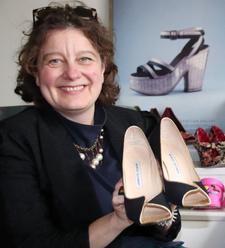

DR NAOMI BRAITHWAITE, Associate Professor, Nottingham School of Art and Design, Nottingham Trent University (NTU) and LISA TRENCHER, Senior Lecturer and Employability

Lead at Manchester Fashion Institute, Manchester Metropolitan University (Man Met), discuss their collaborative approach to supporting ‘industry readiness’ for a sustainable career in fashion
As academics with fashion industry backgrounds, we are passionate about sustainability We recognize the urgency and opportunity for graduates to implement positive change, whilst filling the green skills gap in the fashion industry
Our aim is to inspire and empower students to take on global fashion industry challenges including pollution, consumption, sustainable business models and workers’ rights We must ensure that students are informed of these challenges and equipped with the employability skills required for sustainable change as they will be gatekeepers and define how responsible the industry is in the future
Sustainability goals within the fashion industry have shifted towards fashion business practice and citizenship, providing opportunities to develop the curriculum supporting the development of skills for a greener fashion industry

When developing a greener curriculum, a collaborative approach with both industry partners and students is key. Academic research, live briefs, guest speaker sessions and conversations with industry partners provide insight into both the challenges surrounding sustainability and the skills and attributes required by graduates to undertake these challenges.
Placing students at the core of curriculum development is a key strategy. We have initiated several projects at both universities which have applied co-curricular and curricular approaches to work together with students to understand their attitudes towards sustainability through different learning styles
A current internship through jobs4students, ‘Careers in Sustainable Fashion,’ facilitated by Lisa as employability lead, provides the student with access to library resources and support, LinkedIn guidance, and industry personnel The student is researching and developing resources for other students supporting the development of 'green skills', including those required to support resource efficiency, a low carbon economy, climate resilience and the management of natural resources
A previous internship through RISE (Manchester's co-curricular initiative for the development of employability skills) began the initial development of resources for sustainability Four students created resources which included examples of job opportunities, industry perspectives via interviews, company profiles and research material Whilst there is a time commitment for academics facilitating co-curricular activities, the output has provided valuable insight which has informed pedagogical approaches moving forward It has also provided excellent resources to benefit both students and staff The internships gave students confidence and developed their ‘ green ’ employability skills Following the internship, one of the students secured an industry placement as a sustainability assistant
As well as being industry professionals, it is important that students recognize their role as consumers and acknowledge the challenges that consumption presents to the fashion industry This inspired a module project at NTU which involved 80 students analyzing their attitudes towards clothing consumption and ownership through wardrobe audits
Student reflections were transformative in drawing out a deeper understanding of how individuals value clothes and what motivates consumption, attachment, and disposal of garments The ongoing project enables students to reflect on challenges and opportunities for change at consumer level This research is then used to inform the development of business models that can drive down consumption while still fulfilling consumer needs This process supports students in building skills required to support a green economy
We are keen to identify more opportunities for collaboration with our respective careers services For example, an element of the co-curricular RISE opportunities at Man Met focuses on sustainability themed courses and activities, including 'How to be a Sustainable Citizen' and 'Social Enterprise' Students explore these areas, receiving accreditation and increasing knowledge whilst being challenged to develop a more critical approach. Whilst not fashion industry specific, these opportunities give students a strong understanding of responsible business practice which is extremely valuable in terms of enhancing their employability and CV content. There is an opportunity for careers teams to signpost students or even embed these resources within more generic careers resources.
Other initiatives have included a mini online sustainability conference in Manchester with guest industry speakers, including presentations from students who had undertaken the internships. This proved both motivational and inspirational for students who followed up with lots of questions on careers in this area Moving forward, we would like to do a conference across both universities, collaborating with our respective careers teams
Through our teaching and projects, both institutions have noted an increased student appetite for change, validating the importance of the work needed to fill the green skills gap This is a huge task; we need to ensure our students are knowledgeable, passionate, and hungry for change, whilst possessing values of citizenship We are confident this generation of students are ready to take on the challenge Our role is to empower students to make real change
‘To our students who ask hard questions, contribute fresh ideas, and are endlessly passionate for the work of social responsibility You make us proud Now go out and change the world ’ (Dickson et al , 2009)
naomi.braithwaite02@ntu.ac.uk
"During the Rise project, I was able to develop my communication skills, through both collaborating and working with the rest of the team and conducting interviews with individuals within the industry. Furthermore, this enabled me to build industry connections, whilst understanding and gaining first-hand insight into what businesses and employers are looking for in potential new candidates.
"It is amazing to realise how diverse and personal our own clothing values are. I can see how it is important to define and understand these as it gives the wider context in which sustainable consumption exists.
The internship has made me aware of the specific areas I already have experience in, that play a role within the sustainable movement, and particularly how these roles might change and adapt in the future."
Undertaking the wardrobe inventory made me realize how much stuff I have at university and at home. When I saw what I don’t wear in my wardrobe I thought I will make an effort to wear them all now."
Our students will be the gatekeepers defining how responsible the fashion industry is in the future

TOM McCANN, Projects Manager at the University of Reading, outlines the development and implementation of a new Skills Award linked to sustainability. The award tasks students with completing extra-curricular activity to develop their awareness of sustainability issues, solutions and opportunities, while also developing their employability skills.
It was spring 2022 and we were keen to launch a new Skills Award at Reading in the upcoming summer We already had the RED Award – Reading Experience and Development – and we enjoyed the playful opposition of a 'green’ award for sustainability
As discussions continued, we decided 'green' wasn't the perfect fit Having an award that specifically linked to 'green' would potentially narrow down opportunities for different activities, and we didn’t want to limit our students' imaginations when it came to approaching sustainability. We decided to utilise the UN Sustainable Development Goals (SDGs), a strong, existing framework that could guide students to help make the world a better place without limiting them to narrow areas where they could take action.
'Sustainable Action' was then tied into our RED Award – an already developed brand embedded across the university, with an existing award infrastructure (such as the website) to utilise. This meant staff would see the award as an addition to our already successful awards portfolio, rather something brand new. The name was easy, then. It's our RED Sustainable Action Award.
The idea of a sustainability award came from the Education for Sustainable Development group at the university, which would be a key stakeholder moving forward. They were keen to use a ‘Learn, Act, Communicate’ approach to the award, so we built this into the award design.
We ask students to complete 40 hours of activity across the ‘learn’ and 'act' stages, with a minimum of 10 hours in each. The students must identify how the activity they are doing supports one or more of the UN SDGs and reflect on this when submitting activity. As a final stage, students are required to communicate, or as we call it 'Articulate'; becoming agents of change and encouraging others to take action. Students have freedom to do this in many different forms, but it must be public facing, like a presentation or even a post on LinkedIn
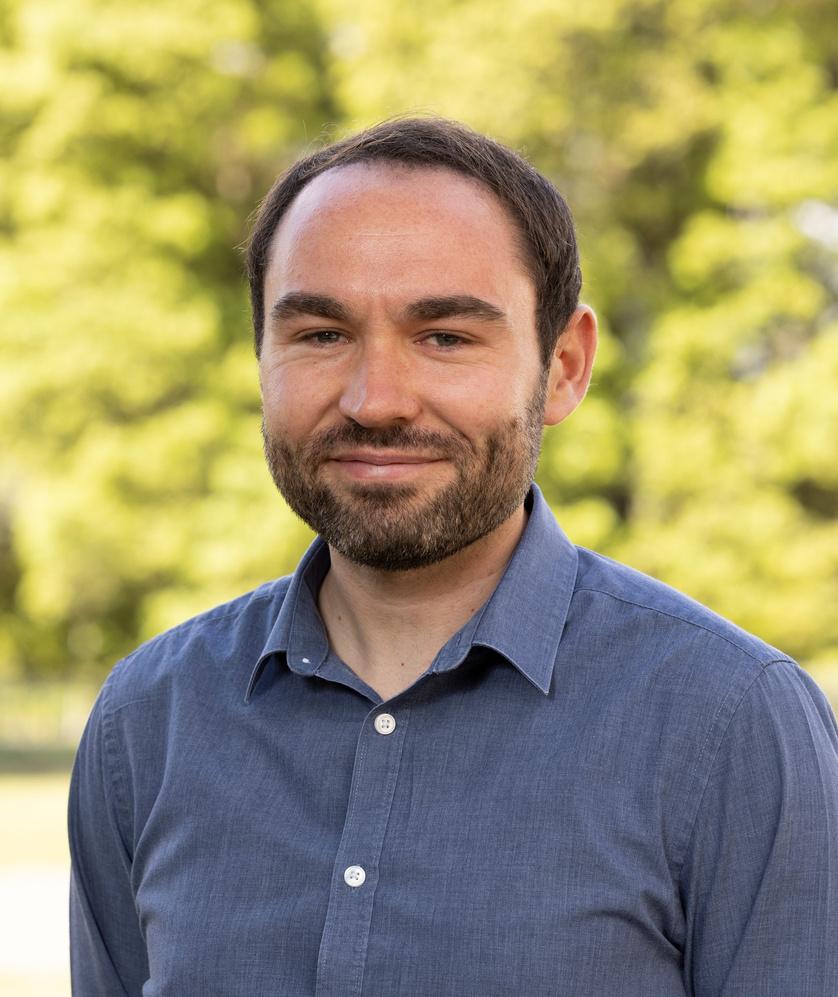
The award has now been running for almost an academic year and has engaged over 200 students. This includes first year undergraduates all the way up to PhD students, with the highest proportion of students coming from our business school, agriculture department and geography department.
Students have submitted activities linked to 16 of the goals (out of a possible 17) with them most frequently completing activities linking to Goal 11 - Sustainable Cities and Communities, Goal 13 - Climate Action and Goal 15 - Life on Land
Some examples of activities include students attending a UNITE2030 conference, working on a hydrogen in aviation project and supporting a campaign for the Plant Based Universities group Students have also been involved in a startup repurposing wastewater from buildings, helped to run a hedgehog-friendly campus campaign and taken part in litter picks
At the 'Articulate' stage, we have seen students present at a Sustainability Summit organised by the Students' Union, present at team meetings and create and share videos via LinkedIn
We are really pleased with the way the award has developed in year one, but it has certainly come with challenges Firstly, we've noticed that some students have been struggling to come up with relevant activity to use towards the award Although we gave the students broad scope by linking to the UN SDGs, some students have been unsure and requested we provide a list of activity options to choose from
On top of that, we now have three RED Awards available to students – the RED Award, Global Engagement and Sustainable Action – which has led to some confusion We’ve had to adapt our student introduction sessions and spend more time with students at outreach events, such as fairs, explaining the difference between the awards and helping students figure out which is the most suitable for them to start with It's been a challenge to make our three key messages of why they should undertake an award clear, and we still have work to do on this
Another obstacle we've faced is a lower completion rate for this award compared to our traditional RED Award It seems that the final 'Articulate' stage has posed difficulties for some students, as they struggle to find opportunities to complete this stage Lastly, while the award has been successful in engaging students with certain widening participation markers, such as disabled students, we've noticed a lower percentage of participation from other groups, like BAME students, compared to our traditional award
We've used many different approaches to reach and engage our students, like setting up areas in the university cafes to speak with students directly, and supporting the Student Union's sustainability initiatives We will build on our learning into the next academic year as we expand and improve this work We'll be engaging first year students by collaborating with halls of residence and catering outlets that cater to this group

The development of the RED Sustainable Action Award has been a journey filled with insights and challenges By embracing the UN SDGs as a guiding framework, we've encouraged students to make a positive impact across a wide range of areas While we've seen strong student engagement and diverse activities linked to various goals, there have been hurdles such as students struggling to identify relevant activities and confusion surrounding multiple awards Looking ahead – we're excited to continue our efforts with further collaboration and enhancing participation from underrepresented groups

Students have made a positive impact across a wide range of areas
LISA MARRIS, Head of Research at GTI’s market research consultancy, Cibyl, and LAURA YEATES, founder of the Sustainable Recruitment Alliance (SRA), outline findings from the latest SRA Impact Report and outline how sustainability impacts students' career decisions and views of employers

The Sustainable Recruitment Alliance (SRA) published their latest Impact Report in May 2023 This was based on a survey of 2,400 students from 127 institutions, conducted by Cibyl, with analysis by specialist sustainability reporting firm Greenstone
Over nine in ten students agreed when asked if the issue of environment and sustainability is important to them And when it comes to their views on employers, over nine in ten think employers should take action on environmental sustainability So, it is no surprise that sustainability also impacts their career decision thinking Of the students who responded to Cibyl's survey, one in ten said that environmental sustainability is their top consideration when choosing an employer One in five said they think about environmental sustainability in graduate career engagement
‘I only considered graduate employers that had a genuine concern for sustainability and are taking steps to turn this concern into tangible action that is positive for the environment. Companies have a huge influence on society and the environment and must use this to make positive change.’
Student survey responder
Now that employers have come back to campus, have they brought their merchandise with them? From pens to phone chargers to glossy brochures, employers use products to attract students But one in two students say free merchandise has no influence on them, or even makes them less likely to apply to an employer One in two students have refused offered merchandise at some point
‘Merchandise is irrelevant. I will apply if I have a good experience with their representatives and they have a post that I wish to pursue. Merchandise feels like bribery, I’m not a fan.’ Student survey responder
The SRA was founded in August 2020 with the mission to reduce the carbon footprint of early talent professionals 17 organisations initially signed up Now, 88 employers plus nine universities are signatories
Greenstone analysed data from 38 employer SRA signatories
Although their on-campus event attendance is almost back at prepandemic levels, signatories cut their emissions by 95% over the last three years from 91 tons of carbon dioxide to 4 5 tons by purchasing lower emitting materials for events or eliminating them altogether This is equivalent to the annual emissions of seven people in the UK
'Our audiences expect us to be bold and ambitious in our sustainability efforts. This drives us to further challenge our practices, identify partnerships, and innovate wherever we can.'
 Toby Horner, Early Talent Acquisition Manager, Clifford Chance
Toby Horner, Early Talent Acquisition Manager, Clifford Chance
Greenstone analysed the type and carbon emissions of materials used in the merchandise employers purchased Employers who purchased lower emitting materials made a big difference to their carbon footprint The starkest example was in the use of textiles Textiles based merchandise was the largest cause of emissions in 2019/20 at 52 8 tonnes of carbon dioxide This fell to 2 6 tonnes by 2022/23 Textile products made up just 11% of the total weight of merchandise but constituted 60% of overall emissions Total emissions across all material types would have reduced by 58% had all merchandise been made with reused materials instead of new materials
Here are three key steps the SRA recommends that employers and universities can take when procuring materials for events:
Reduce the amount of merchandise purchased for events or replace them with a different way to communicate your message
Phase out merchandise made from textiles
Favour products manufactured from recycled materials rather than virgin material
23 of the SRA signatories have committed to purchasing no merchandise at all, meaning they will produce zero emissions
To sign the pledge, visit SRA Alliance
The SRA Impact Report was released in May 2023 and produced in collaboration with Cibyl, Greenstone and Blackbridge Communications
SRA: contact@sraalliance co uk
Lisa at Cibyl: lisa.marris@cibyl.com
TOM STAUNTON, Lecturer in Career Development with iCeGS at the University of Derby, explores the importance of professional identity for grounding critical responses to the sustainability agenda.

What is central to the identity and practice of a career professional? And how does this relate to engaging with the sustainability agenda? I've spent a significant amount of time thinking about professional identity over the last year as I've taken our MA programme through validation. It's been a valuable time to think through what is core to being a careers professional and how this relates to a changing society.
Ronald Sultana and Tristram Hooley state that
I believe careers services and practitioners need clear views on how they relate to social issues. Do you encourage students to think critically about the role of work in society? Do you engage constructively with employers around the quality of their graduate schemes? Do you help your students understand how their work might contribute to the greater good? And how do you incorporate impartiality in these discussions? I am not advocating for any of these things per se, but you should do them because of your vision of what is at stake in careers work, not just to respond to a new agenda. Your ethics and identity should be upstream of your practice.
(Journal of the National Institute
that we refer to as 'career guidance' needs to be fuelled by a clear understanding of what is at stake " for Career Education and Counselling, Issue 36) In other words, we can't just assume that careers guidance is going to improve society and make the world more socially fair, just by being there Careers practitioners don't just reproduce a set of practices, they make a difference one way or another We must have a clear view of 'what is at stake'
Careers practitioners need clear, research-led approaches to their identity, ethics and practice in order to engage with new challenges Without this, I think there are some obvious pitfalls that higher education careers professionals and services can fall into when engaging with the sustainability agenda
One of these is the danger of 'greenwashing' All institutions need to play their part in responding to climate change, but universities can easily be accused of using a desire to appear to be green without really engaging with the issue at hand HE careers services can do the same, wanting to show their worth internally by engaging with their university’s sustainability strategies to legitimise themselves, rather than because of the value they can bring to changing the institution
The sustainability agenda can also be in danger of making HE careers professionals responsible for things which are out of our control Everyone should play their part in building a more sustainable future, but all parts are not of equal size Let's not forget who needs to make the big changes A focus on individual responsibility can obscure the fact that what oil and gas companies or certain governments do is more important than improving a university recycling scheme
We need a robust view of professional identity, that clearly shows how we are contributing to society through the sorts of graduates we create and how they think about their contributions to the world around them This purpose should ground us as HE professionals and give us a clear sense of what we are trying to achieve, otherwise we risk burdening responsibility where it does not belong I passionately believe this will include engaging with the sustainability agenda, but we need to be clear about why we are doing it
When I teach our Master's course, I want to help develop students and career practitioners who deeply understand issues around social justice and their professional identity, and how these link to their practice This should lead to a professional stance that is engaged, authentic, and aware of its limitations
"the social practice
We need a robust view of professional identity, that shows how we are contributing to society


Career Consultants ANDY SMITH, SALLY HALL, HANNAH WOOLLEY and SARAH AINGER from the University of Nottingham Careers and Employability Service share an insight into the work they are doing around sustainable careers including Sustainability Action Week, Sustainability Challenge and the online resources being developed for students and graduates
Sustainable careers have become a growing trend in the modern job market, covering a wide range of industries and professions from renewable energy and green technology to sustainable agriculture, eco-tourism, and conservation As concerns about climate change and environmental issues continue to grow, individuals and organisations are recognising the need to prioritise sustainability This is reflected in the work we have been doing in the Careers and Employability Service (CES) at the University of Nottingham (UoN) We are developing resources for students to research careers in sustainability, opportunities to gain experience and running events to meet relevant employers
The university has sustainability at the heart of its strategy, with 'Contributing to Sustainability Development Goals' as one of its key areas of focus Led by the UoN Sustainability Team, there is a Strategic Delivery Plan for Environmental Sustainability which involves all aspects of the University As a result of this collaboration, we have been able to develop our offer to prepare students for careers in sustainability
Sustainability Action Week (SAW), a partnership between the Students' Union (SU) and the UoN Sustainability Team, in collaboration with CES, is aimed at raising awareness among students about sustainability issues and engagement opportunities CES embraced the opportunity presented by this themed week to offer a diverse range of sector insight events to our students By organising events on topics such as sustainable fashion journalism, renewables, retail, and many others, the insight events 'Spotlights on Sustainability' opened avenues for students to explore how sustainability intersects with their respective fields of interest
Speakers and professionals provided firsthand knowledge about sustainability challenges and innovations, inspiring students to think critically and creatively and recognise the relevance and impact of sustainability in their chosen career paths CES was able to generate case studies from these events to showcase practical applications of sustainability principles, motivating students to pursue similar paths and become catalysts for change SAW also facilitated networking opportunities, allowing students to connect with professionals
Outside of this focused week, we intend to embed a sustainability question into all our sector insight events, inviting speakers to share something which addresses sustainability in their workplace.



Our events allow students to explore how sustainability intersects with their respective fields of interest
Fifty shades of green:

We ran our first Sustainability Challenge in 2023, which took place over three afternoons During the first session, supported by colleagues from the UoN Sustainability Team and the SU, students explored eco challenges on campus and generated ideas for potential green solutions. In the second session, after a masterclass on persuasive pitching from a graduate employer, students refined their initial thoughts and crafted presentations to showcase their thinking. During the final session, student teams pitched their concepts to a panel of employers and UoN staff and received constructive feedback.
Winning ideas included composting food waste, rewarding vegan choices in food outlets, and installing energy generating pads in high-footfall areas. These ideas will be a catalyst for our future thinking on sustainable development at UoN The challenge provided an excellent opportunity for students to grapple with real challenges, develop valuable employability skills, and win prizes The pilot saw 34 students from across all five faculties take part, which offered inter-disciplinary richness All survey respondents agreed that they felt they'd learnt something new or developed their understanding, and that they would be able to put this learning to use in the future One student shared advice to fellow students via the CES blog
Collaboration has been the key to our success Bringing members of staff across the university including CES and the Sustainability Team to form the UoN Careers in Sustainability Steering Group has allowed us to deliver a range of events, insights, work experience opportunities and resources for our students Formed a year ago, the group meets regularly to discuss the needs of students and the university in relation to careers in sustainability
To continue to build and evolve the collaborative culture across the university that we have developed around sustainability, our next steps include finding easier ways for our students to identify sustainable roles on our jobs board and careers events We will develop more hands-on insight and experience opportunities for our students, within the university and local community, and provide a clearer guide to students on how to access these. We will also further develop online information and resources on sustainable careers as part our Career Paths webpages to help students and graduates explore the sector. Sites such as Green Jobs and The Sustainability Exchange have been excellent sources of information.
Through an upcoming communications campaign, we will also be further supporting students to understand and explore sustainability and the impact they will make through their career choice. The campaign will showcase learning resources and opportunities, and we will coordinate with academic colleagues on curriculum activity. Through all of these initiatives, we will make further strides in preparing our students for sustainable careers
Sally.hall@nottingham.ac.uk
Andrew.smith2@nottingham.ac.uk
Hannah.woolley@nottingham.ac.uk
Sarah.ainger@nottingham.ac.uk
"By taking part, you will encourage the project’s growth, meaning that more can be done to improve standards of sustainability at UoN. This also provides great experience for networking, taking part in other extracurricular and SU activities, and can help aid your awareness of sustainability in your future career."


integrating sustainable development into careers service activities She outlines the challenge of transforming the service amid a tricky regional context as an area historically heavily tied to the fossil fuel industry
As an early careers member of staff passionate about sustainability, I identified a gap in our service provision that is particularly topical in the Northeast of Scotland Known in the last century as the Oil and Gas Capital of Europe, our regional landscape is changing as we adapt to alternative energy sources and prepare for a just energy transition
As part of the Aberdeen 2040 strategy, the university is committed to 'support our community to live and work sustainably' Integrating sustainability into the careers service and uncovering the labour market changes that directly impact our students and graduates supports our institutional strategy and the necessary transition to a green economy
Due to our strategic commitments, the pressure of the accelerating climate emergency and the scale of opportunity in the region's potential future – considering its past and the dichotomy between them – we set up a project team to tackle the challenge.
The team created two project plans – one focusing on reviewing our operational sustainability and the other on integrating sustainability into our service through research, collaboration and opportunity creation Planning is underway to take these projects forward
As an immediate action, I ran a skills development workshop twice in spring 2023, with a 60% increase in attendance for the second event. It was open to all students and explored the context behind the current economic shift and the variety of labour market changes. Through the workshop, I demonstrated the significant transformation taking place in sectors such as energy, transport and agriculture – traditionally the largest carbon emitters We discussed how change is present in all sectors as all organisations must take sustainable development seriously and plan for its longterm application After exploring terms like 'green jobs' and 'green skills' based on research, students conveyed that they were surprised by the range of opportunities available and keen to take advantage of upskilling opportunities presented in the workshop As we restructure our event programme and approach in summer/autumn 2023, we hope to run this event more regularly and reach a wider audience
The scope of Aberdeen's energy sector is changing as organisations are diversifying The transition from fossil fuels has increased focus on decarbonisation technologies: carbon capture, utilisation and storage, hydrogen and renewable energies such as offshore wind Coupled with the growing range of sustainabilityrelated degree programmes and courses provided by the university, it is crucial our advisers and resources are up to date to support our students to take advantage of the growing opportunities and make informed decisions about their future
We created a Sustainability and Green Careers resource webpage where we add research, case studies and job sites
Additionally, for the last three years, sustainability has been a key theme of our work-based learning employer challenge which is aligned to our institutional strategy Local employers have set sustainability challenges for the groups themed around clean energy, sustainable travel and community initiatives A student participant this year said, unique opportunity to gain some valuable skills, meet amazing, motivated people and do something creative, which falls outside the scope of projects I usually complete at university”
“I really liked the experience It was a
Recently, at a Group GTI webinar, employers expressed a need for graduates to have a baseline knowledge of sustainability and climate issues and how they impact organisations As a careers service, we can encourage students to develop this understanding through skills development opportunities We plan to collaborate with university departments and academic experts to showcase their work through articles and case studies whilst supporting the institutional strategy, embedding sustainability in our culture and informing the delivery of our services
A challenge I have encountered is reconciling my personal views within the context of diverse opinions on sustainability and related careers in the region I avidly believe that we are not moving to net zero or absolute zero fast enough, but I also know things can't change overnight

A diverse range of tactics is required to tackle the climate crisis We need graduates lobbying the government for rapid change, and funding to support these changes We also need skilled graduates who understand the context of the climate crisis and energy transition, with knowledge of the technology and industries involved, to work in these organisations and fight for greater change
Cutting ties with industry won't benefit our graduates or our region, especially as traditional oil and gas organisations, of which there are many in the North-East, are diversifying and creating new opportunities There must be an element of trust that these organisations will deliver on the promises they have made through their targets and diversification, and that they, and the government, will ensure a just transition' for workers and our region
We want to encourage our students and graduates to live and work sustainably and choose sustainable careers I believe the best thing we can do as an institution is provide a culture that puts sustainability at the heart of our work and teaches our students environmental responsibility As careers professionals, we will focus on the importance of aligning students' careers to their values, highlighting sustainable careers and employers through our activities, opportunities and collaboration
Hopefully, they will graduate and continue to uphold our values of respect, inclusion, trust and integrity whilst protecting people and the planet
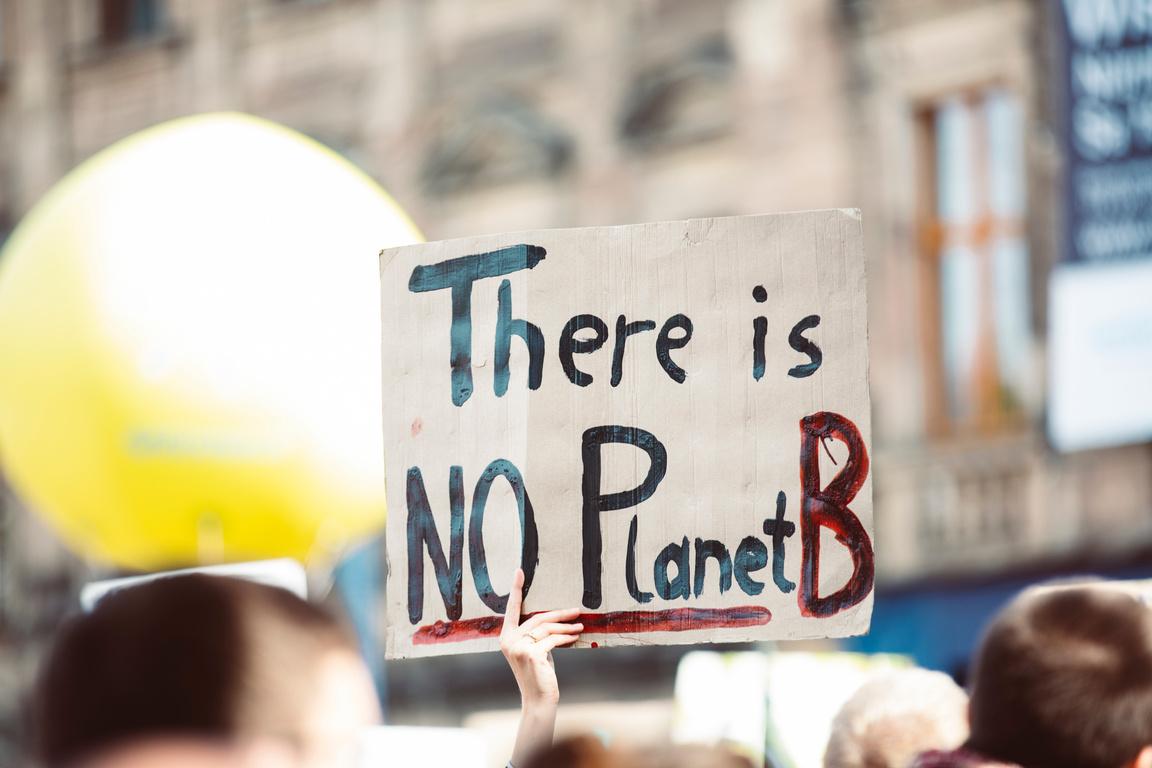 ellen minshull@abdn ac uk
ellen minshull@abdn ac uk
A diverse range of tactics is required to tackle the climate crisis
The four pathway areas we highlight are:
FRAZER STARK, Project Manager in Careers and Employability at the University of Leicester, outlines how their team are guiding students to use environmental tools and harnessing their passion for sustainability with interdisciplinary learning modules
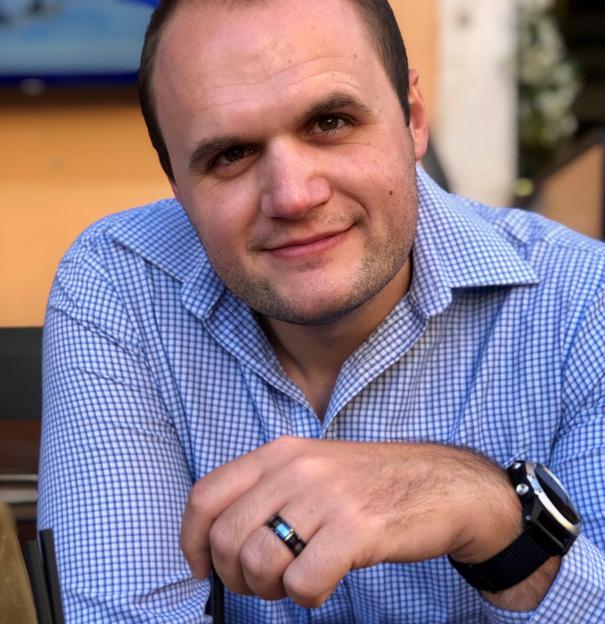
As the Department for Education outlines, the environmental sector is highly complex:
“ green jobs will not be niche We anticipate that sustainability and climate change will touch every career ” Students are passionate about sustainability, with the majority wanting to learn more about it Our staff feel the same, with a dedicated Sustainability Team and a careers service that is pivoting more towards careers through a lens of sustainability
We have introduced two key initiatives at the University of Leicester to support students in thinking about sustainable careers: the Energy and Environment Pathway and the Sustainability Innovator Consultancy Challenge.
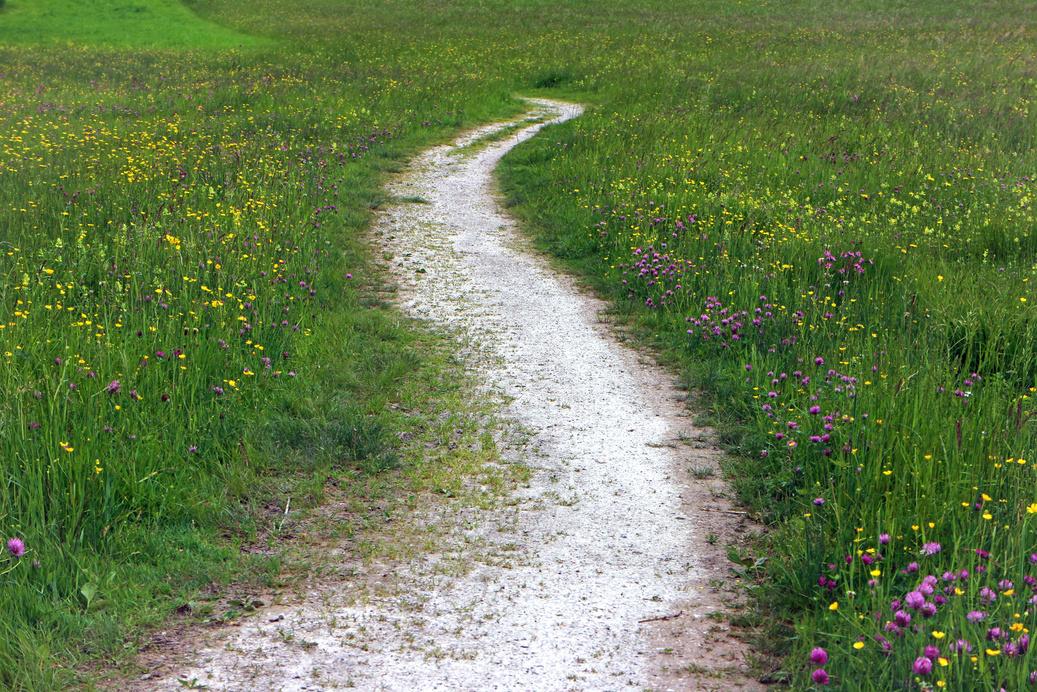
Feedback from student surveys revealed that whilst they value online careers guidance, it can feel complex to navigate and is not sufficiently tailored for their degree and aspirations Enter 'Pathways', an open online resource that breaks down employability actions for students at each stage of their academic journey
With sustainability at the forefront of our strategy, 'Energy and Environment' was the first pathway we produced This splits the sector into bitesize chucks for students (and staff) to chew through, complemented by data from Emissions by Sector
The need for environmental consultancy has grown to such an extent that it sits within its own category. This could be opportunities in leading consultancy firms or local partnerships with smaller firms in Leicestershire.
Some companies purely focus on protecting our environment and guiding others Energy infrastructure takes centre stage here with wind, solar, biomass, hydropower or nuclear opportunities Students may be interested in public sector organisations such as the Environment Agency, conservation with the National Trust, or key technical roles such as geoengineering, earth observation or carbon accounting
Impartiality is a key function of a careers service There are companies who actively contribute to climate change, but there is currently no escaping their function in our society However, opportunity exists for the environmentally conscious student –e g Shell's Carbon Capture and Storage programme or developing electric vehicles in an automotive company
The University of Leicester recently launched the Institute for Environmental Futures, aimed at tackling global challenges The focus is not just our own university research, but also public and private research areas This pathway is for students that want to develop the next disruptive technology
We need multiple solutions for multiple problems
The needs of our first-year students are very different to those of our PGT students To address this, throughout each pathway we lace various types of work experience, companies, volunteering, professionalisation and societies Additionally, we support each pathway with testimonials from current students, alumni and employers to provide personal insights

“This is perfect, I wish I had this earlier Is there one for engineering as well?” was a comment from a student on the Energy and Environment Pathway during a recent career coaching appointment They were struggling to identify options after their placement year, but knew they wanted to make a positive impact on the environment
We plan on making a pathway for each major sector, lacing sustainability options within each Whether it’s bioscience or the arts, we want all students, regardless of degree type, level or nationality, to be encouraged to be sustainable in whatever they do
For the third year running, our Careers and Employability team have delivered the 'Sustainable Innovator Consultancy Challenge' (SICC): an extra-curricular work-related learning module, open to students across all years (both undergraduate and postgraduate taught) This 30-hour, part-time module takes place across two weeks, aiming to boost students' employability skills and enhance their environmental knowledge 29 UG and 16 PGT students took part this year, of which 55% were female
The SICC begins with an accredited carbon literacy training, following which students are split into interdisciplinary project teams and presented a challenge: 'Radical Sustainability'. They are asked to devise ways that the university or local area could be more sustainable, if no restrictions applied. We want to encourage students to generate radical ideas that could be the next research grant or innovative start-up.
Throughout the SICC, workshops are delivered on enterprising skills such as influencing and pitching At the end of the two weeks, students sell their idea to a panel of judges who judge them on their teamwork, presentation skills and the sustainable impact of their idea
“I have the confidence to come up with ideas and the said a 2023 SICC participant. experience of working in a team”
The SICC aims to help students to think outside the box in terms how they can support sustainability And that is what we see in the pitch ideas: from miniature nuclear reactors, to reshaping campus infrastructure for more green space, to the winning 2023 team 'Algaelicious', who pitched algae-powered units on campus Each idea has been posted on the University Sustainability Team's blog with students encouraged to take their ideas forward through current funding and project initiatives
Through our information and guidance for students, careers services have the power to make a positive change by thinking through a lens of sustainability At the University of Leicester, we plan to weave sustainability options into all advice on career paths for students, guided by industry experts and academic researchers in this area We also aim to double our output of the SICC next year, to encourage wider participation, generate more ideas from students and encourage a higher level of interdisciplinary work that breeds innovation Climate change is complex and there is no panacea We need multiple solutions for multiple problems
We break down employability actions for students at each stage of their academic journey
LAURA DORIAN, RACHEL BICKERDIKE and LUCY
MORRIS from the Durham University Careers and Enterprise team outline how their whole team approach has supported the development of a sustainable mindset in their students, and an assessment of their sustainable practices.

Sustainability is increasingly important to our student body, with many actively pursuing careers in sustainability or making career decisions based on an organisation's sustainable credentials Separate to this student-led ambition, Durham University is committed to reducing its environmental impact and is actively working towards solutions to support the UN Sustainable Development Goals (SDGs) The Careers and Enterprise team is making a significant contribution to this agenda
Durham University's Venture Lab works with students and graduates who wish to develop entrepreneurial skills We focus on promoting innovation to help tackle significant global problems In 2019, we developed the Game Changer programme to engage students with the UN SDGs and inspire early-stage, purpose-driven innovation Using design thinking and lean business modelling tools as a basis, students work in teams during a two-day 'sprint' challenge, exploring and defining problems highlighted by the SDGs before pitching solutions in a competitive setting
The programme was designed to be flexible, and as such it was easily transferred online during the pandemic We utilised online whiteboard tools such as Miro to enable teams of students to collate their findings and ideas, and we used live online pitching for the competition element Since moving back to in-person delivery, we have retained the use of online tools for students to use between sessions
Over 1,000 students have participated in Game Changer activity since launch in October 2019, and it was selected as one of the top 21 projects globally (from over 700 nominations) to feature in the United Nations SDG Best Practices publication (page 44-45). We are now turning our focus to embed Game Changer activity into the curriculum to ensure more students have access to innovative skills development.


Aligned with the university's commitment to sustainability, the Sustainability Internship programme nurtures environmental consciousness and gives students hands-on experiences and exposure to real-world projects Launched in summer 2022, the programme is funded by the university’s Sustainability Team (based within the Estates and Facilities Directorate) and benefits from the expertise and networks of the careers team. The programme offers 100% funding to businesses to develop student internships aligned to the UN SDGs.
The funding offer allows the careers team to manage timelines for recruitment and to promote all opportunities under umbrella branding, resulting in unprecedented application numbers. Applications involve a competitive recruitment process, with students applying to each opportunity with a CV and cover letter.

Internships have been created around energy conservation, waste management, carbon footprint reduction, and sustainable practices in research and education By actively participating in research, data analysis, project planning, and implementation, interns develop practical knowledge and skills relevant to their future careers in sustainability development In feedback gathered, one intern remarked “I learnt a lot about each of the areas that the B Corp assessment focuses on (environment, customers, community and governance) and how these apply to small businesses” The impact for employers was clear with 50% of interns retained beyond the project We are applying for funding next academic year to repeat the activity
In response to clear student appetite, the employer services team developed a sustainable careers themed week in January 2023 which offered both employer-led and peer-led content on a hybrid basis. The events were recorded, ensuring information was delivered in real time, but also providing a valuable library of employer content which lives beyond the event. A varied range of employers were selected to take part, highlighting that sustainable career opportunities exist across all industries and organisation types. In addition to employer talks, we ran skill-development programmes aimed at supporting students to become problem solvers for the planet. The sessions were supplemented by a dedicated SharePoint resource which included events, vacancies, careers and employability resources and equality, diversity, and inclusivity related content
Events were attended by over 100 students, with over 600 views to the SharePoint resource page We plan to repeat the sustainabilityfocused careers week this coming academic year and hope that increased awareness will improve student attendance
We are committed to revising policies and practises to ensure our activities reflect the sustainable ambitions of the university Beyond this, we are also responsible for the delivery of a programme to support students and graduates to realise their sustainability careers and entrepreneurial ambitions
In summer 2022, we audited our work to capture the breadth of sustainable actions and activities coordinated by the Careers and Enterprise team This exercise was hugely beneficial In having a clearer understanding of our sustainable goals and behaviours, it has been easier to make informed, intentional decisions including not commissioning printed notebooks, using QR codes to link resources and sourcing local speakers
Durham has a strategic goal to improve sustainability and is exploring opportunities to embed sustainable learning into the curriculum
Headline
Strategy
Without the audit, and the underpinning evidence collated, it would have been difficult to evidence the role of the Careers and Enterprise team in promoting sustainability related learning The audit has allowed us to proactively contribute to conversations focussed on supporting students to develop their sustainability related knowledge and skills The prompts in the table will help you to audit your own activity
Through adopting a whole team approach to sustainability, we have a clearer understanding of our own environmental impact and have positioned ourselves as educators of sustainability, providing opportunities for skill development, applied learning and careers education
Laura.Dorian@Durham.ac.uk
Rachel.Bickerdike@Durham.ac.uk
L.A.Morris@Durham.ac.uk @careersatdurham
Sustainability actions
Have you engaged with your sustainability team? (or equivalent)
Do you comply with your institutional environmental policies?
Have you assessed activity against the People and Planet Ethical Careers and recruitment policy?
Can you/have you reduced your physical resources?
Do you encourage employers to reduce give aways or printed material?
Do you offer virtual events to limit employer travel?
Do you have a named sustainability champion?
Skill development
How do you develop a sustainability related skillset and knowledge base in your students?
Do students have access to e-learning modules?
Do you promote involvement in relevant societies?
Do you promote external competitions?
Can your enterprise team/business advisers support sustainability related entrepreneurial ambitions?
Do you have access to mentors with a sustainability awareness?
Careers education
How do you inspire and educate students and graduates to better understand the career opportunities in the sustainability sector?
What relevant resources do you have?
Do you host sustainability-focused careers events?
Access to opportunities
Do you offer mentoring by professionals in the sustainability sector?
Do you offer internships or other sustainability focused work-based learning opportunities?
Do you recognise internships which have a sustainability focus?
Is your CRM searchable by "sustainable" or "sustainability"?
External promotion
Have you submitted any award nominations?
Can you share student success stories? Including skill, careers and entrepreneurial development
Have you presented activity at any conferences or publications?
Next steps
What can you do to improve your sustainability actions and delivery?
Green careers:

REBECCA RICHARDS, Employability Development Adviser, and EMMA FOROUZAN, Employability Development Manager at University of South Wales (USW), outline some of the initiatives USW have explored to support the UK government’s net zero strategy, and how universities and careers services can showcase the potential of the rising green economy.
In November 2020, the UK government released its Ten-point plan for a Green Industrial Revolution to achieve net zero 2050 and boost the economy post-pandemic The plan aimed to mobilise £12million of government investment, and three times this from the private sector, to create and support up to 250,000 green jobs Locally, Wales has pledged under the Future Generations Act 2015 to support green growth At USW, we have been working to support this plan and to enable our students to make conscious decisions about 'green careers'

Environmental and social responsibility is of particular importance toGen Z, with 55% saying employers should take it seriously, and almost half (48%) refusing to join a business that doesn't have clear environmental and social goals

To truly promote sustainable jobs, it is essential to raise awareness amongst undergraduates about the diverse career paths available in sustainability Career fairs, guest lectures and mentorship programs can bridge this information gap and inspire students to consider sustainability-oriented professions
These experiences not only expose students to sustainable work environments but also allow them to develop critical skills and networks within the field Furthermore, collaborations between universities and sustainable businesses can foster research partnerships, enabling students to contribute to real-world sustainability challenges and solutions
Within the careers service we have introduced a range of sustainability initiatives to motivate and inform our students and help them to build connections Green Futures is a panel event introduced in 2020 to showcase professional careers within sustainability Our key speakers have included representatives from the Welsh Government Energy Service and Transport for Wales, outlining national green policies and sharing their passion for their work This event is always well attended and student feedback has been positive, asking for this to be an annual event While previously delivered online, this year we intend to hold it on campus and incorporate a networking event to allow the students to meet the panel

We are fostering a campus culture of sustainability
We have successfully incorporated sustainability into our employer engagement and enterprise activity In 2023, we developed a virtual work experience opportunity with Green Element, where students undertook carbon footprint analysis of different activities Eleven students have completed so far and feedback from the employer and students has been positive, despite some early-stage glitches in the questionnaire that had to be resolved Through the USW Mentor Scheme, we have connected students with environmental consultants and ecologists to get a sense of what these job roles entail and to encourage networking in the sector
Several enterprising USW students who have received guidance from our Student Enterprise Team are developing thriving businesses, such as the founders of B Corp Flawsome Drinks These students were driven and inspired by sustainability, helping communities, caring for the planet and acting as role models for other students, and they look to USW as a talent pipeline for their recruitment processes
As a careers service, we have also contributed to university-wide sustainability initiatives Through the Turn USW Green scheme, we reward students for being 'consciously green' Students exchange 'green activities' for points which are then converted into vouchers for the high street We have many students engaged in this initiative which is having a positive impact on recycling in general on campus Many students also donate to local charities and leave unwanted items for future students to use

Beyond formal education, the culture of our university can also be influential. Encouraging student-led initiatives, clubs and organisations centred around sustainability can provide platforms for knowledge sharing, collaboration, and activism. We promote biodiversity inside and around the university campus. USW is a hedgehog friendly campus, we adhere to ‘No Mow May’ and encourage students to participate in various habitat surveys
Green initiatives within the university itself not only drive sustainable practices within the university community but also empower students to become ambassadors for sustainability in their future workplaces At USW, we have a Sustainability Policy to help us achieve net zero by 2040 where we are committed by way of a Sustainable Environment Accelerator Our world-leading experts use their cutting-edge research to develop curriculum that help our students to address the challenges facing the world, now and in the future
Sustainability is embedded in the USW curriculum design principles During immersive learning weeks, the careers service work with academics across all courses to consider environmental challenge hacks, aiming to ensure that all students become ethical sustainable citizens.

Some courses are ahead of the game. Fashion have embedded sustainability throughout the curriculum, resulting in graduates with a focus on sustainability in the industry. In liaison with academics, the careers service support those students who wish to create small ethical start-ups such as Sage Against the MachineandAngels Clothes Rental. These organisations become role models and guest speakers to inspire the next generation of students.
It is vital that we as careers professionals ensure our students are aware of opportunities that exist and are supported to develop sustainability skills during their time at university. While our efforts are already underway, there is still much more that can be done. By integrating sustainability into education, providing practical experiences, raising awareness, fostering a campus culture of sustainability and allowing for sustainable job growth, we hope to inspire the next generation to build green careers. This will help students and graduates to tackle the global challenges we face
University of the West of Scotland was recently named Higher Educational Institution of the Year, at the 2022 Herald Higher Education Awards and is one of Scotland’s largest modern universities Our reach across the south and west of Scotland, together with our London campus, means that UWS is a significant force in global knowledge creation, innovation, and a leading provider of undergraduate, postgraduate and research degree education. Our degrees provide students with a transformational experience, resulting in highly sought-after graduates in world-leading sectors, industries and businesses.
UWS’s employer-focused degrees align with business, community, third sector, government and international priorities, and provide the perfect
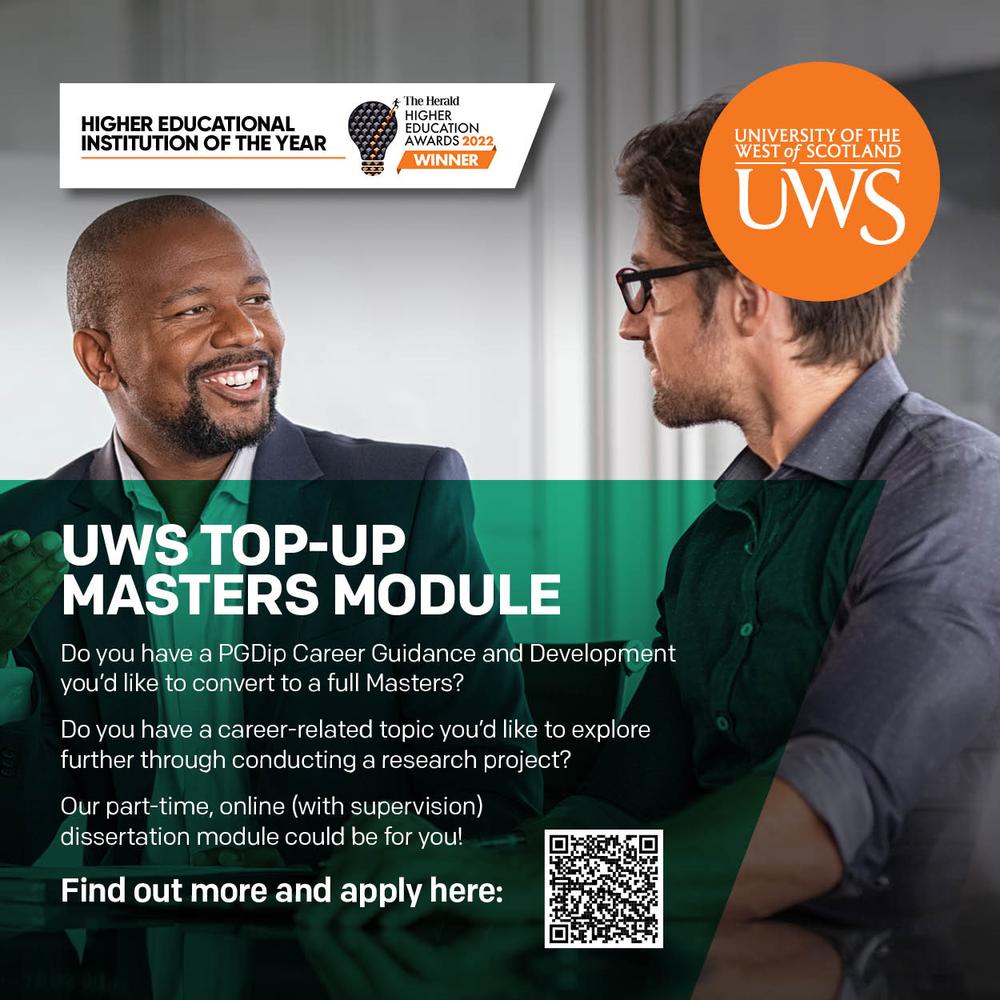
With cutting-edge courses, modern pedagogy and practical knowledge, we enable our students and staff to experience the joy of learning, teaching, research and innovation, and apply their knowledge for the benefit of others.
www.uws.ac.uk
SARAH LONGWELL, Careers Consultant at Keele University, gives a career practitioner's perspective on new publication ‘How to Enable the Employability of University Graduates’
 (Eds Saskia Loer Hansen and Kathy Daniels, Edward Elgar, 2023).
(Eds Saskia Loer Hansen and Kathy Daniels, Edward Elgar, 2023).
Given the title, this publication is presented as a 'How To' book, but this fails to convey its complexity and depth. How to Enable the Employability of University Graduates is a thoughtfully introduced and carefully curated collection of perspectives upon, and experiences of, enhancing student and graduate employability It is a refreshingly up to date publication with acknowledgement of the impact of the pandemic, the ongoing development of curriculum, the diversity of our student body and the emergence of new universities

The authors are from a diverse range of professional backgrounds ranging from senior academics to enterprise specialists and careers consultants This enables differing perspectives and experiences to be showcased The definition of employability is discussed and debated, and the ownership of employability is also questioned This material is valuable for those with an opportunity to influence and shape university policy and strategy, and to inform and update careers and employability practitioners collaborating with academic staff and delivering to students and graduates
The structure of the publication provides a strong introduction to the concept of employability and its place in higher education The Foreword and Preface (which are often skipped over, but in this case are worth reading) are valuable as they convey the book's critical approach regarding the definition of employability and introduce the themes embraced in the content The interspersing of reflections from students and employers between each contributor's professional perspective provides breaks between the articles and valuable insights
The categorisation of the sections such as 'What Employers Want from Graduates and Employability' and the 'Curriculum to Widening Participation' and 'Institutional Response', enables the reader to easily navigate the book and focus on the sections relevant to their role and expertise This is important in a content-rich publication Arguably, the section entitled 'Innovative Approaches to Careers Guidance' is more about developing careers education and the delivery of effective services rather than careers guidance It is, nonetheless, a valuable section drawing upon the importance of pedagogy to design and deliver high quality careers education, tailored support for specific cohorts and the value of peer-to-peer support and learning
Looking to the future, the international tone of the publication is significant The global nature of employment for graduates and the importance of supporting and empowering increasing numbers of international students in UK universities is reflected in the section 'International Students' The benefits of learning from expertise in other countries becomes very clear when reading contributions in 'Insights from around the World', embracing the experience of colleagues in Europe and further afield
Whilst there is a specific section entitled 'Practical Examples of Employability Activities', to which the practitioner's eye is drawn, most of the contributions focus upon case studies This reflects the 'How To' aspect of the publication Whilst the contributors embed research and policy into their writing, the focus is upon showcasing innovative examples of careers and employability case practices. Again, this is valuable both to practitioners planning and delivering services and careers education and managers in a position to impact upon strategy, policy and resource allocation in their universities.
The concluding contribution guards against complacency. As we emerge into what we believe to be a post-pandemic world, Helen Higson both reflects on the last twenty years of employability and contemplates the future. As all of us try to anticipate what lies ahead for students and graduates and how we can best equip them for life after university, Higson lays out what she has in her sights with her next project She anticipates exploring the new employability landscape, empowering our graduates to navigate what may be an increasingly precarious and unpredictable world and equipping them with the skills and resilience to embrace their career futures These themes will resonate with those of us engaged in careers and employability in any form
This publication will not only be of value to the HE careers and employability community, but also to academic colleagues and HE education policy makers Its interdisciplinary, research-based and international scope renders it a valuable resource for the HE employability agenda
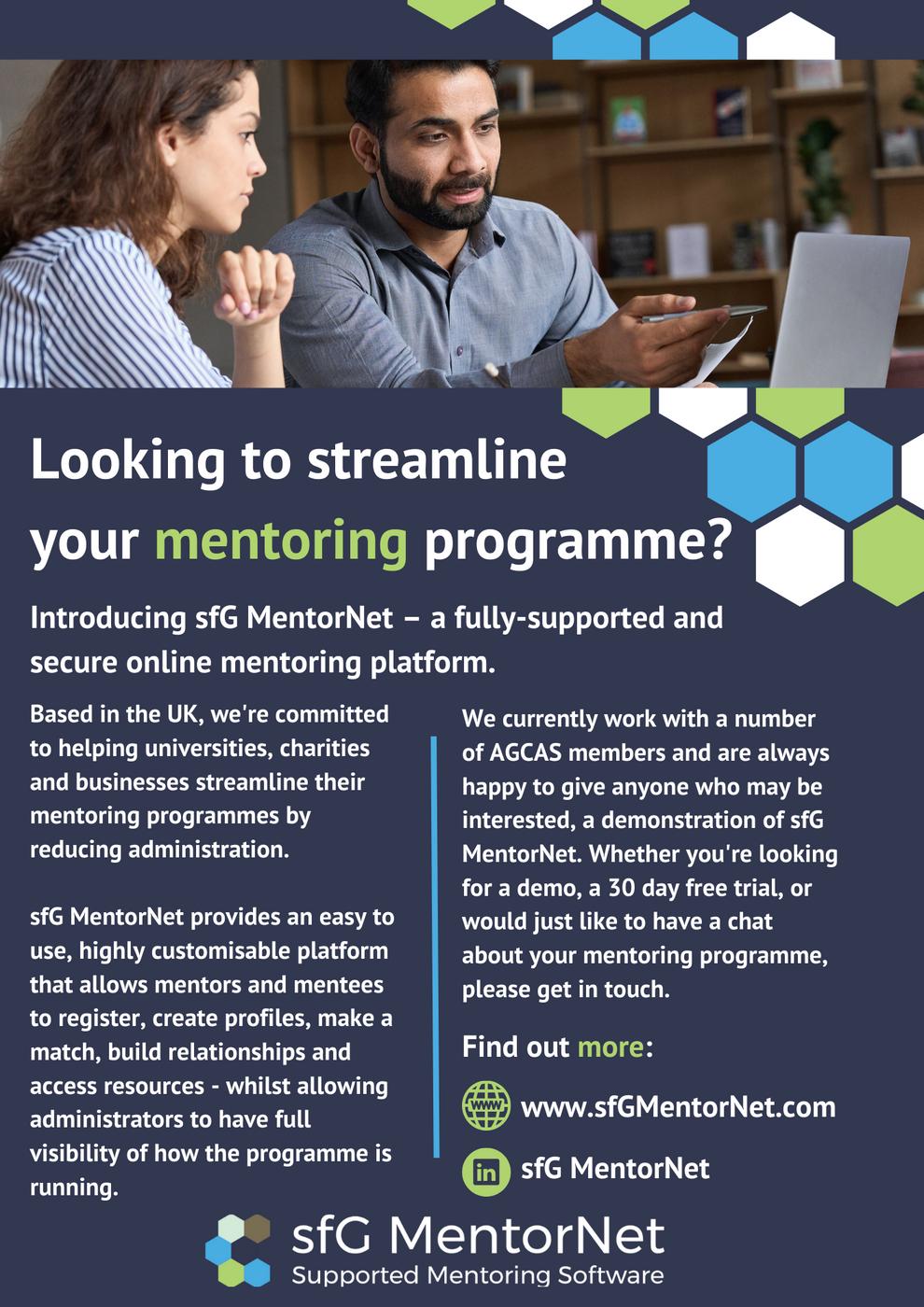

In the quest for a green future, job creation in the field of sustainability is crucial. Mentoring programmes have emerged as a transformative tool in providing guidance, support and skill development for individuals aspiring to build careers in sustainability. In this era of digital connectivity, online mentoring software emerges as a powerful platform tool to connect mentors and mentees worldwide At sfG MentorNet, we are excited to influence the potential of online mentoring software in promoting sustainability There is a myriad of ways in which online mentoring software can contribute to sustainability efforts and we'd like to share the ways in which they can enhance knowledge transfer, skill development, and empower individuals to drive positive change
Before we delve into the role of mentoring, let's understand the context The world is embracing the need for sustainability, leading to a rise in green jobs The renewable energy sector alone employed over 11 million people globally in 2020, as reported by the International Renewable Energy Agency As the demand for skilled professionals in sustainability continues to grow, mentoring emerges as a pivotal catalyst for bridging the skills gap and creating a competent workforce capable of driving positive change Online mentoring software plays a crucial role in meeting this demand by providing individuals with the necessary guidance and support to succeed in sustainability-related careers
Mentoring programmes also serve as catalysts for entrepreneurship and innovation in sustainability. Statistics reveal that entrepreneurs who receive mentoring are four times more likely to experience business growth, as highlighted by a study conducted by the Small Business Administration. Mentors provide guidance on developing sustainable business models, navigating regulatory frameworks, and accessing funding opportunities. By instilling entrepreneurial skills and fostering a mindset of innovation, mentoring programme empower individuals to create their own sustainable ventures, driving economic growth while addressing environmental problems.
“Sustainable development is a fundamental break that’s going to reshuffle the entire deck. There are companies today that are going to dominate in the future simply because they understand that.”
Francois-Henri Pinault

Mentoring programmes play a vital role in equipping individuals with the skills and expertise necessary for success in sustainability careers Statistics highlight the effectiveness of mentoring in enhancing job-related skills, with a study conducted by the American Society for Training and Development reporting that an impressive 75% of executives credit mentoring as a crucial factor in their professional advancement Mentors act as guides, sharing their knowledge, experience, and industry insights, empowering mentees to navigate the complexities of sustainability work By nurturing talent and providing personalised support, mentoring programmes shape individuals into skilled professionals ready to tackle sustainability challenges head-on
An important aspect of mentoring is its ability to drive diversity and inclusion within the sustainability job market Research shows that diverse teams are more innovative and perform better, as reported by McKinsey & Company Mentoring programmes provide equal access to guidance and support, ensuring that individuals from underrepresented groups can contribute to the sustainable workforce By fostering diversity and inclusion, mentoring programmes create a rich tapestry of talent, perspectives, and experiences Online mentoring software, like sfG MentorNet, breaks down geographical barriers, providing equal access to mentorship opportunities for individuals from diverse backgrounds.
Online mentoring software serves as a catalyst for job creation in sustainability, empowering individuals to develop the skills, knowledge, and entrepreneurial spirit necessary for success in the green economy. By leveraging technology and mentorship, we can foster a workforce equipped to tackle environmental challenges while driving economic growth. If we can help encourage and build mentoring relationships, we can build a diverse and skilled workforce that spearheads sustainable innovation and propels us towards a more sustainable future.
“We don’t have to engage in grand, heroic actions to participate in change. Small acts, when multiplied by millions of people, can transform the world ”
Howard Zinn


De Vos, A , Van der Heijden, B I , & Akkermans, J (2020) Sustainable careers: Towards a conceptual model Journal of Vocational Behavior, 117, 103196.
In this paper, De Vos and her colleagues offer a conceptual model of what a sustainable career looks like, describing sustainable in this context as a positive, meaningful, lifelong career They suggest that a sustainable career is one in which an individual can be happy, healthy and productive Happiness incorporates both satisfaction and career success; health is mental and physical, and productivity includes performance, organisational citizen behaviour and employability I like the breadth of these three indicators of sustainability and can see alignment with a range of other popular theories, including the boundaryless and protean career paths, psychology of working theory and the positive psychology ideas of meaning.
The authors also explain the factors or processes that lead to a sustainable career. This is a bit more complex, but highlights that careers are a product of an interplay between person (their agency and values) and context (situation, events and timing), explaining that characteristics of proactivity and adaptability can influence the relationship between the two. If you haven’t come across this theory before I recommend the paper (do drop me a line if you can't get hold of it) It's quite meaty, but I think has a lot to offer us
Karaca-Atik, A., Meeuwisse, M., Gorgievski, M., & Smeets, G (2023) Uncovering important 21st-century skills for sustainable career development of social sciences graduates: a systematic review Educational Research Review, 100528
Karaca-Atik and colleagues reviewed recent studies that have looked at the skills that social science students need to develop a sustainable career and identified two crucial skills: communication and problem-solving The authors also identified a second tier of useful skills including critical thinking, initiative and self-direction and social and cross-cultural skills This list probably doesn’t come as a great surprise to those of you working in the field, but more interesting, I think, is what the authors didn't find First, that whilst they looked for papers that focused on all three indicators of a sustainable career (happy, healthy and productive), they found that almost all of the research focused on the skills needed to get a job, and to a lesser extent the skills needed to keep a job Studies that examined performance, satisfaction and engagement were few and far between, and the authors didn't find a single study that tried to explain how exactly these skills would contribute to a sustainable career This seems to reflect the somewhat narrow scope of career and employability research at the moment, focusing on the short-term transactional aspect of how to get a job at the expense of deeper understanding of what is going to contribute to long-term satisfying and productive relationships between workers and employers

Kwon, C K , Guadalupe, S S , Archer, M , & Groomes, D. A. (2023). Understanding career development pathways of college students with disabilities using 'crip theory' and the theory of whole self Journal of Diversity in Higher Education
Kwon and colleagues emphasise the need for more research and action focused on the career development of students with disabilities They quote some stark statistics that show that both degree and employment outcomes for students with disabilities are significantly less favourable than for their peers without disabilities, and they urge the research community and universities to focus more on the support that they offer to this group They talk about careerrelated challenges that students with disabilities face, including identifying their own disabilities, managing disclosure, and the limiting attitudes of others (family, campus policies and society) which can have a negative impact on these students’ career aspirations The authors make a compelling case for institutions to put the needs of this group of students at the heart of their organisations and their policies, providing more targeted services (including specialist careers services), and including disability as a critical diversity factor – along with the commensurate funding and focus The authors use 'crip theory' to help to understand the experiences of students with disabilities This theory aims to critique the norm of ‘acceptable’ body appearance, and perceived social or cognitive ability, and to reject medicalised or pathologized social attitudes towards people with disabilities They authors make a powerful case for the need for change and give a number of specific suggestions for targeted career support including ideas for working collaboratively with university disability services and local l
The Status of Research in Women's Career Development" The Counseling psychologist (00110000), 51 (6), p. 786.
Nadya Fouad offers a very interesting critical review and summary of the vast swathes of research exploring women's career development looking at adolescence, post-secondary education, and work In the research into adolescence, the body of research has focused on parental influence, and specifically on the positive impact a good mother-daughter relationship can have on career choices A key finding in the early adulthood research is that women's career choices are influenced by their perceptions of the barriers they are going to face Fouad gives the example of engineering students who decide against a career in engineering because they find the undergraduate engineering culture unwelcoming Looking at women's experiences in the workplace, the research focuses on the continual process of negotiation that women experience, juggling work and personal lives and highlights the range of barriers women face including lack of access to mentorship or promotion, lower pay, sexual harassment and pressure Motherhood is a topic that is widely covered and the key message is that mothers face multiple barriers which can prevent their full re-engagement with the workplace, and that their partner's attitude to work (both their own and their partner's) plays a pivotal role in women's career trajectory Fouad suggests that we need more diverse groups of female participants, and more longitudinal research, and that career counsellors should raise awareness of these potential barriers when working with younger female clients


The Prospects Early Careers Survey finds while student engagement in careers has dropped, professionals are valued more than ever
We are in the third year of the survey, which charts the study and career plans of around 5,000 students and graduates annually
This year the findings back up what we have been hearing from careers services across the country around student disengagement with careers activities, particularly in the wake of the pandemic
On the bright side, colleagues will be reassured to know that it is likely this downward trend has stabilised and when students seek advice, professionals are considered the most helpful sources of information
Students were asked if they had attended different types of careers sessions, either online or in-person over the last year The only activity which saw an increase in attendance was careers lessons and workshops, which were attended by 45% of students The largest decline was people looking for CV, cover letter and job application guidance However, they were also attended by the same proportion (45%)
Students at careers advice appointments had dropped from 53% in 2021 and 43% in 2022 to 41% this year Attending talks by employers declined from 54% in 2021 and 43% in 2022 to 42% in 2023 Attendance at careers events fell from 62% in 2021 and 48% in 2022 to 47% in 2023
This illustrates that while there is a continued decline in careers engagement since the pandemic, we are perhaps starting to see it plateau Next year ’ s data should indicate whether we have arrived at a new normal
This year we added a couple of new categories to this question Among them was the most engaged activity – talks by university staff (59% of students) Job interview preparation was the least attended activity (28%), although this is likely due to the fact that this would be relevant to a smaller group of students
Students were asked where they tended to go to for advice about careers This year nearly one in five students (18%) had not sought any advice, compared with 15% the previous year
University students were most likely to seek advice from careers websites such as prospects ac uk, careers professionals and family, respectively When it came to what they valued the most, however, careers and industry professionals came out top On the other hand, printed magazines, social media and friends were rated as the least helpful
This highlights just how important it is for careers services to collaborate with industry professionals. Likewise, it shows how important it is for students and graduates - especially those from less advantaged backgrounds - to engage with careers professionals when they have the opportunity to do so. Careers professionals can act as an important 'leveller', using their expertise to ensure that everyone has equal access to the information that they need to succeed.
The value of careers professionals and the work of careers services was further demonstrated with findings that show those who attend sessions are more likely to feel certain about their future career plans than those who do not engage
Prospects Early Careers Survey is available to download from Luminate Look out for more in depth analysis which will be shared on the site throughout the summer

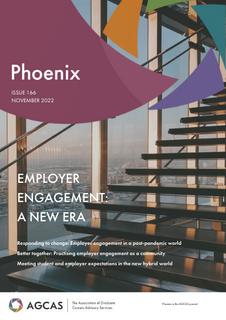






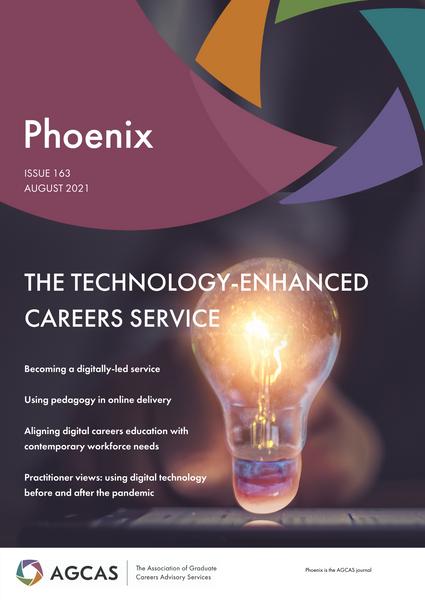
THIS ISSUE INCLUDES CONTRIBUTIONS FROM AGCAS MEMBERS AT THE FOLLOWING SERVICES:
Aarhus University
Cardiff Metropolitan University
Durham University
Leeds Beckett University
Loughborough University
Manchester Metropolitan University
Newcastle University
Nottingham Trent University
University of Aberdeen
University of Bath
University of Birmingham
University of Cambridge
University of Derby
University of Exeter
University of Leeds
University of Leicester
University of Liverpool
University of Northampton
University of Nottingham
University of Reading
University of Sheffield
University of South Wales
University of Sussex
University of Warwick